C.M. Rosens's Blog, page 8
April 23, 2025
Audio Release for Yelen & Yelena Chapter 13: Wind and Water
Yelen and Yelena head down to the dungeons and the underground spring to do some blood letting, and Yelen begins to accept personal responsibility for his past. Stick around to the end of this shorter chapter for some behind-the-scenes worldbuilding chat, where I discuss my influences and how I used folklore and Beauty and the Beast adaptations to help shape the world and the characters.
Listen NowCWs: Depression, and suicide ideation more pronounced here. Blood-letting with antique medical equipment.
Needle/injection description begins at 08:29 – jump to 09:00 to avoid the description of the injection itself.
There is conversation and some character notes from 09:00 while the blood-letting takes place (it’s painful).
This whole sequence from needle in to taken out runs from 08:29–10:00. After 10:00 there is mention of wound cleaning.
Music Credits:
Kevin McLeod (incompetech.com) Licensed under Creative Commons: By Attribution 4.0 License creativecommons.org/licenses/by/4.0
Quinn’s Song: The Dance Begins
Bittersweet
Quinn’s Song: A New Man
Transcript for Worldbuilding Chat:00:19:53.200 –> 00:29:08.420
This is a shorter one again, and I wanted to leave it there because we’re now going into part three, The Rot, with chapters 14 to 20. But also I thought I could do world building part two on the end of this shorter episode.
I’m going to talk about some influences for this and also some of the folklore that I used while I was worldbuilding.
So one of the most fun things about the worldbuilding was riffing off the Beauty and the Beast story, where Belle’s father is a merchant who falls on hard times and Belle’s sisters want silks and expensive gifts when he gets back from his latest venture that’s going to turn his fortunes around. But all Belle wants is a rose. One of my favourite live-action versions is the 2014 version with Vincent Cassell as the Beast and Lea… Seydoux, I think I said that right, as Belle, directed by Christophe Gans.
In that one she falls in love with him through her dreams of seeing him interacting with his late wife, which is gorgeously French, and she literally just has these dreams of him as a man, and he’s married to the love of his life and she sees them interacting and she’s like yes that is the man that I want to marry myself when she dies.
And then like, when… she’s awake she denies that she cares about him because he’s a beast and he’s also very annoying, very grumpy, and then he lands on top of her during a chase scene and they nearly kiss but they fall through the ice or something like that and then there’s a lot of fantasy elements…
And it’s a lot of fun but there’s also a lot more time given to the family back home and the father’s debts and the consequences and there’s all of these shady gamblers and debtors going on and ruffians and it’s it’s just – oh yeah I just really liked it as a as a film because there’s quite a lot of influence here.
And I wanted to switch it up a bit and have my protagonist already on Hard Times. And I took the merchant idea and I was like, what if it’s a world where merchants run everything? And so it would make sense if my protagonist is not part of that class at all. And I did kind of toy with the idea of making her father a merchant who is now not a merchant. But I kind of like the fact that he never ever got to be and so that shapes Yelena in a different way to a way, you know, where she potentially thought she’s owed something or she feels like she should be part of that class but she isn’t. I kind of wanted her to be completely separated from it and have to sort her own life out and have very little agency and be very aware of the agency that she doesn’t have.
So I knew that was the situation I wanted her to be in and I built that world for her to be at the bottom of the pecking order.
I didn’t know anything about her really but I wanted to kind of see how the world would shape her, how the situation would shape her. And also it’s very difficult to build a Belle character that isn’t like a shell of a person from all of the other stories. So I wanted to make her kind of her own person.
And I also used the Disney animation version. So the songs about Belle being from a poor provincial town as my setting inspiration. I grew up in a very small place, which is not really a town. It’s in the countryside. I couldn’t wait to leave it. And I ended up basically back there as an adult for the longest time. And I know a few people who left and then deliberately came back because they love it so much. And they have many ties to it. And they literally can’t imagine living anywhere else because they love it. Like they go away for university. They go far away. They go to London. They go to like, other cities. They try life out somewhere else. And it’s just not for them. And they come back.
And that’s what I wanted. I wanted to kind of honour that story of someone who loves their village, loves their community, loves all the memories they’ve made there, and then they have it taken away from them piece by piece until there’s nobody left And everyone who is left is so busy fighting for their own survival there that they’ll turn on each other. And it’s kind of like this deconstruction of a community that’s just had its heart and soul ripped out of it, just because everybody’s moved away. A lot of Yelena’s family are all dead. That’s just part of my story and it’s part of communities that I know.
And so I put all of that in there as well because I kind of don’t like the… naivety, I suppose, of oh it’s a poor provincial town and I’m too good for it, and I don’t want to be part of it, and they’re all really narrow-minded here, and they’re all selfish, and they’re all… you know. It’s just such a stereotype and I know that there are also small towns like that, but I don’t know, man. I think a community is what you make it, you know.
And I kind of liked the idea of there being a community there that was worth going back to. And so that was Yelena’s story. And I deliberately didn’t want her to be conventionally beautiful either, because I really don’t see the point of that. And I also deliberately didn’t want Yelen to be a Disney prince, even if he changed back. Because again, I don’t see the point of that either. And I thought, you know, if he changes back, he’s going to be a fat man in his 50s. not some ripped angelic looking 18 year old. And I really like that. So it’s an age gap thing, even if he hadn’t been cursed for 200 years. And I quite like that too.
So that’s why Yelena then became a laundress and a sex worker for fun and profit in her 30s. So she’s still quite young, but she’s also not a kid who doesn’t know the world. She’s had time to build up some adult life experiences. She’s
been beyond the village and come back. And she’s a much better match for Yelen as he is now than a younger girl would be, so…
As for the aesthetics of it, I think a lot of that are influenced by the disney animation which I think sparked my love of the Gothic as a small child, and also of course Jean Cocteau’s 1946 version which I really love, but a lot of the village itself and village life comes from Juraj Hertz’s 1978 Czech New Wave production Panna a Netvor, The Maiden and the Monster or Beauty and the Beast and that’s the one where the beast has a bird head and is a kind of half man half bird and is really weird like I really love that I think that’s probably my favourite film. So that’s where a lot of world building came from and I built it from there.
The Butterfly as souls is a piece of real world folklore. In Ireland, white butterflies were thought to be the souls of departed [or unbaptised] children,
which is where I think I heard it first, and I couldn’t remember the source for it so I looked it up, and it’s everywhere. So, I didn’t know that there are butterfly legends in Mexico as well. It’s an indigenous Mexican myth about butterflies
being the souls of the dead but I haven’t really looked into that, and also it’s in Japan too, and I thought that was really cool so I thought okay. I stuck with it as a piece of folklore because of the European folklore connection, the Irish connection, I kept that in.
The wind was just a random thought because of the way we anthropomorphise the winds and the way the wind is described as having a voice, it whispers, it screams, it cries. So I thought it would be good to give it an actual stream of voices to carry and make it part of the fantasy afterlife and weave it into folk belief and religion. And I thought maybe city people can’t hear those voices because they’re no longer attuned to them. And the provinces are still one of the only places that you can hear the dead voices on the wind properly above the noise of life or what the industrial life and urban life has become. And that might be really fun to explore if I do anything more in this world where the wind could be used to differentiate the city from the country.
I have mentioned As Below, So Above before, and that also takes place in a rural setting, and it’s all set in an alchemy tower. So I won’t be exploring the wind concept there, I don’t think, but we’ll see.
So I thought it would also be nice to have the water carrying something too, and for there to be debate about it. So that kind of… balanced out the wind, I thought we also need something else that’s more kind of grounded, and again water is often anthropomorphized as babbling, chattering, laughing, especially in mid-20th century children’s books that were read to me as a child. Like, the laughing brook, the laughing stream… and I think I just internalized that because that’s what I instinctively think of as an adjective. I think of like, you
know, The Laughing Stream or something, so it made sense to have the water be the laughing element that balances out the bad news of the air.
So I think that’s what I was going for, and that’s sort of how my process went and some influences that got me thinking about the layers I was going to build on, and where some of those ideas began.
I had a lot of fun building up my fantasy religions, as you might have noticed, and the legends in particular, so I may talk more about that in future episodes, but for now. I will leave it there and see you next time. Bye for now.
April 21, 2025
Dark Fantasy Romance: Meet S.R. Severn, author of ‘Pirate’s Vow’, on the Eldritch Girl Podcast

S. R. Severn (she/her) is a British author who writes dark fantasy romance and loves devising different ways she can make her characters suffer, both in and out of love. The vital ingredients found in her books are steampunk, mythology, and morally grey characters with happily-ever-
afters.
Her love for romance novels was first discovered at the age of eleven after picking up a Mills & Boon book. She grew up with a fascination for the supernatural/paranormal, Greek mythology, steampunk and developed an unhealthy obsession for fantasy. Since then, she’s collected enough books to build a spacious book fort.
The inspiration to become an author came during her years studying Creative Writing at the University of Greenwich in London. After being unsuccessful in finding a book combining all the things she loved, she decided to create it herself.
She currently lives in London surrounded by her hoard of steampunk and pirate trinkets. When not writing, she can be found gaming, reading under cosy lighting or cocooned in a comfort blanket watching movies.
Listen to the podcast InterviewRead S.R. Severn’s Author Spotlight InterviewAuthor Links:
Instagram: @s.r.severn_author
Website: srsevern.com
GoodReads: goodreads.com/srsevern
Amazon Author Page: amazon.co.uk/dp/B00IK8EJ8I
CMR: Hello, and welcome back to Eldritch Girl. And today we have S.R. Severn with us, which is really cool and exciting. Can you introduce yourself for us, please?
SRS: Hello! Hi! Thank you so much for having me. I’m Sab. I am a British fantasy romance. Indie, author. I first self published in 2014 with my debut novel called Origin, but since then I did a huge rewrite of that publication, and I republished in 2024. So it’s been 10 years worth of rewrites and reworking, and now it’s under a new title called Pirate’s Vow, which is what we will be talking about today.
CMR: Really exciting. I’ve already had Sab as an author interview for the Author Spotlight Series as well. So you can see a very short version of her interview, which is just a text interview on my website. So yeah, Sab, would you like to introduce the extract that you’re going to read for us, and then you can crack on with that.
SRS: Thank you. Yeah. So I will be reading the blurb first, just so listeners can get the feel for the book, and then afterwards I will read an extract featuring two of the characters and their first initial arrival in the city. So this is blurb.
Introduction to Pirate’s VowBLURB:
Pirates seek freedom. Highborns crave power. The gods demand worship. The Sacred desire peace. How could there possibly be room for love in a world full of peril, definite adventure, mythic creatures, annoying deities, unbreakable prophecies & twisted curses?
Once upon a time, Kennedy Jekyll and Viera Goslink were slaves, dreaming of freedom and a future together. But the fates would tear their paths apart until that once clear dream is fogged with time, becoming a bitter memory.
Ten years have passed. Viera lives as a Highborn, dedicated to keeping Belle Vue city and its residents safe as a Badge.
Kennedy thrives as a pirate, duty bound to seek vengeance for his fallen comrades who met an untimely demise at the hands of the city Viera protects.
When Ken is arrested and imprisoned, she must battle the darkness inside his heart to save him. Time may have hardened him, yet the chemistry between them is still as intense as the day they met, reawakening a passion they thought had died long ago.
Reality is harsh and the gods are cruel. Their paths may have merged once again, but it’s paved with injustice and pain. Kennedy sees the cruelties of the world, Viera is blind to it. Desperate to open her eyes, Ken will stop at nothing to expose the truth, even if it costs him his life…and his heart.
Add to goodreads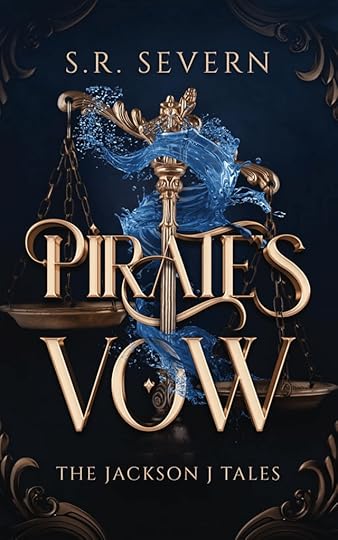 Buy Now: Amazon POD & KUExtract from Pirate’s Vow
Buy Now: Amazon POD & KUExtract from Pirate’s VowSRS: Right, and this extract is from Chapter one, and for context it is when Kennedy and his brother first arrive in the city 10 years prior.
Interview Transcript: Discussion
Despite the bulk of the machinery, exosuits were agile and gave the navigator enhanced speed and strength. There were so many different types; ones for diving, walking through fire, construction, battle. Too many to count, and many Ken probably had never, ever seen before.
Gus nodded, even as they were escorted away from the queue, and into a well built stone building with more people than seats. People held in quarantine stood or sat on one side, whilst the other side, beyond a glass wall had desks where Badges made telephone calls on ivory rotary phones and typed smoothly on shiny typewriters.
Ken stood against the wall with his brother away from the crowd of settlers who had just arrived off the boat. Many of them eyed one another with suspicion and dislike, before looking away he averted his gaze completely, instead focusing on the Badges beyond the glass.
Badges were officers of the law, and often distinguished from highborns by the imperial uniform of a long coat fashioned with more buttons and buckles than Ken thought necessary, black knee-high boots, leather armour, chest plates, and firearms strapped across their torso. Failing that, there was the golden cuff on their wrist, always on display during working hours. Embossed on the carat’s surface were Justice Scales, the symbol of the Olympian goddess of Justice, Themis.
Ken watched as their belongings and passes were handed from one Badge to another, until someone made the call to the Jekylls. He caught his brother’s eye. Gus gave him a nod of reassurance. It was always the same procedure. Lord Jekyll was called by the Badges. Questions were asked, then they were released from quarantine to carry out their job until their maximum stay period expired – which was another thing. Even though they had been granted permission to travel, they hadn’t been given the power to choose where they had to make earnings. On their papers, the maximum stay in Bellevue was two weeks, the shortest stay so far in the two years they’d spent moving from one place to another.
It baffled him as to why this non-airship town was even on the list. Every city capital they’d stayed in had been different. No, scratch that – every city capital they’d been in had been better. The airships were an integral part of trade and business, a reliable, fast, efficient form of transportation, and normally owned by highborns, the constabulary, or traders.
He didn’t want to judge a city by its appearance, but he scoffed. There wasn’t much else he could do.
One of the Badges picked up a small device and held it to their mouth. Seconds later, their names blared out off a rustic megaphone on the ceiling.
“August and Kennedy Jekyll!”
Grateful for the rapid response, they both kicked off the wall and sifted through crowds of other members of the public. Once they reached the glass wall, a young Badge with brown eyes, dark hair, and fair complexion, approached. One look at Gus and Ken, and suddenly he stood taller, though Ken couldn’t understand why. Neither he nor Gus were threatening in any way, aside from maybe their tall, broad frames, physiques earned from hard daily labour.
They both shared similar features, aside from Gus’s shoulder length hair, which was neat, whereas Ken’s messy mass underneath his own tricorn hat stopped at his ears and was a permanent case of bed hair.
“Lord Abraham Jekyll confirmed all your details. You’re free to enter.”
“No, really?” Ken received a hard elbow in the ribs for that.
Gus glared at him before smiling apologetically at the Badge. “Thank you, officer. Our belongings…?”
“…Will be taken out to you in due course. Once they’ve been stamped,” the Badge answered with a sniff. “Before you get comfortable. It is protocol. We give you firm awareness of how our city works. You’re both slaves, and as you don’t belong to any of our highborns, you’ll both stay in General Gateway. Secondly–“
“I’m sorry, General Gateway, where exactly is that?” Gus interrupted.
The Badge sighed and pointed a gloved finger out the window. From their view Ken could see the faraway burning lights of buildings in the distance. As his eyes followed the warm lights on higher hilly grounds, he noticed the lights became scarcer until there was nothing but the twinkling stars of the night.
“You see the lights below the cliff? Those are the homes of the lower classes. That’s General Gateway, and where you’ll be both residing for the next two weeks. If you go uphill, you’ll you’ll find golden bricks underneath your boots. That’s Grandeur Gateway, home to the Highborns, and you’ll need to turn back immediately.” He pinned both of them with grave glares. “It’s a serious offence for outsiders to be caught around the area, and I’ll impart this to you both. I don’t think even your master can save you if a Bellevue Highborn sees fit to have you arrested for trespassing.”
“No worries. We won’t be going anywhere near there,” Gus assured, as Ken stiffened.
The Highborns separated themselves to that extent? How in Zeus’s name were they meant to make their sales without the Highborns? His gaze returned to the window, where he could now make out a dim but existent glow of light at the top of the cliff.
The more he learnt of Bellevue, the more it irked him. How typical of a city to have the Highborns placed above the lower classes, and even more annoyingly, have the ground they walked on paved with gold, whilst the lowborns, hard-working, wage-earning citizens, got bricks of bronze and silver.
What bothered him more was the echo in history of the gods who lived on high Olympus, a glorious mountain, so tall and vast the top was hidden from the eyes of mortals. Highborns were not gods, they were mortals, they bled. And if it were up to him, he’d prove it.
CMR: I really like the gaslamp fantasy mixed with Greek mythology mixed with alternative universe stuff. It’s really fun. So we’re going to have a little chat about that. And first of all, I’d like to ask you about your genre. So how long have you been writing romance? And I know you also really like dark romance. So not just cosy romantasy, but more specifically the darker themes in that. So what led you to that? And have you always written in that genre? What’s your relationship with it?
SRS: Okay! So I think I first delved into romance during university, and I think that decision stemmed from the fact that I was studying creative writing, which is an amazing subject. I adored it. And I really learned about different writing platforms. Different modes of writing, and I remember creating some stories of things that I really enjoyed. However, it wasn’t necessarily what was best at the time during my my studies. So I kind of felt quite restricted in what I was writing. So I remember around the time that I was studying, I decided, let me just try writing my own thing, my own romance.
I hadn’t initially started massive plotting. It was more like an experiment, more like fancy kind of thing that I wanted to do. Aside from my work, and I had always grown up reading romance, I think, from the age of 11. I picked up a Mills & Boon book, and yes, 11 is probably a very young age to pick up a Mills & Boon book, but it was my mother’s, and she had taken it from the library, and I found it, and I’ve always loved reading. I’m an avid reader. So I started reading Mills & Boon romance from the tender age of 11, and I fell in love with… just romance. Just love, just two people trying to overcome their their struggles, their conflicts, coming together in the end, and having that happily ever after. So it was very, very, very lovely and whimsical and fluffy and I’ve always loved romance.
When I got older I had this huge fascination with Greek mythology, and I studied that in school.
And I suppose when I reached that point where I felt comfortable enough to start my own story, I wanted it to definitely be a romance. I just wrote these two characters who we know in Pirate’s Vow as Ken and Viera, and there was no real muscle to them. They were just there as existing characters in my brain, and I just had them come together, and gradually I thought I could actually build on this. I can build around them as a personality, and create a world around them.
And the dark romance of it all came a lot after university where I had read fantasy novels and I reached a point where as I started reading other kinds of romance stories, I wanted to try something new, read something new. And I found myself down the rabbit hole of dark romance. It was a huge shock factor to me, because it was definitely different from the conventional romance that I’ve been reading before, where it was very sweet. I wish I could go back and experience it all because I it changed my life. It honestly did, and I found myself addicted to dark romance.
At the time I started going into dark romance, I never felt that I was brave enough to even write dark romance. But I just knew that romance was my thing. It was within me. Because I love it. So Origin came about with Kennedy and Viera, and them to just being, two young teenagers who had met one summer, fallen in love, and then were separated for 10 years, and then eventually come back to each other, and that was it. There was no world building around it. There was no status, there was no real struggle with them, too, that came a lot after.
And the reason why there’s this huge story of me publishing in 2014 and republishing in 2024, is because I self published without any help, I self published without an editor to help me work on that that story, and it was a mess. I will admit that it was very messy. I had all the elements of everything that I loved in that, but absolutely no direction, no structure. So just imagine. Imagine, like, 6 things you absolutely love more than anything, and you just throw it in a story. So yeah, it took me a long time, and an editor’s help to get it to where it is now.
I hope that answers your question.
CMR: That’s perfect. Yeah, that’s great! So, okay, so let’s dig into the world building of it, because we’ve touched on that in your answer, like how you develop that a little bit more. So what was your starting point for the kind of like the gaslamp fantasy kind of world. And how did you? What was the process like of building it for you?
SRS: Okay. I love steampunk. That has a huge impact on the the world. I can’t even remember when I first fell in love with Steampunk. I don’t know where that came from, I think it I think I must have seen it in movies. I also have a huge love for Victorian London and that time period, and I suppose I had never read a book where it had that steampunk element, or it had a hybrid of futuristic elements that I like, or Greek mythology. And like. I said to you I adored Greek mythology. I still do. And I love romance. But I’d never come across a story that had that combination of all the things that I really really wanted to write. So I just thought to myself, well, if I can’t find a novel that has all these things, what if I just create it myself.
So I in my book, I don’t have a time period stated. It’s all down to the reader’s interpretation of what I’ve put on paper. So when you immediately go into the story, there are snippets of extracts from people in the past who talk about the different reigning periods of the gods. So you you go off that. And you learn about. Okay. So this is when the world was ruled by these gods, and then these gods, and then these gods. And this is where we’re currently at. And this is who rules the world and who the the society worships.
I remember definitely wanting the world to be a hybrid of Victorian London but still keeping the world that we know. So there are countries that we know of. But it’s kind of like a parallel world. So, the world isn’t called Earth. The world is called Spironus, and the countries have Spiro in front of it. So Spiro-England. So in a way, readers can somewhat have an idea of what each of these countries have or what they’re like. But it’s not actually a huge reflection on what we know in reality.
And I chose fantasy because I love being in control of what I write, and I have tried writing in other genres, like subgenres of romance before, but there’s always rules to it. And whereas fantasy for me, I make up my own world, my own rules around that. And I have that freedom. So yes, if you can imagine in your brain, and this is what I’ve wanted readers to imagine when they read. The first book is to envision Victorian London with steam powered machinery, but also there’s their own source of power that they use. So it’s almost futuristic in some aspects. But old, there are horse drawn carriages, but then there are also vehicles. There you’ll find, like cobblestone paves and old Victorian buildings, yet you’ll find mansions that are made of marble and pristine gold, and and then you have the temples from Olympus and Greek mythology to worship all the gods. So it is a hybrid world. It’s a vast world, where, in a way, you never really know what to expect, and the struggle of writing something like that… It is easy for me to get carried away. But it is something that again I feel so in control of. I love it, and it makes me feel happy. I feel like I’m escaping from the real world.
There’s so much to the world building, too, because, as you probably got from the extract, there are statuses. So the world is divided. There’s a huge hierarchy. The gods are considered the highest power, and below the gods you have the highborns, and those are people who have societal power and privilege. Then you have the lowborns who are wage-earning citizens, who don’t have the privileges that the highborns have, then you have the slaves who are the lowest on the hierarchy, who are owned by highborns, and even the slaves have their own statuses. And again, it’s quite similar in in the city where the statuses are ranked by bronze, silver, and gold.
And I again, I can’t actually say where the desire came from to create this hierarchy. But I can say that I think I can understand why I wrote this to be a dark world. And I think it’s because at the time during my life I was going through difficulties. And I, I found myself, after reading dark romance, specifically seeing the struggles of 2 people and their trauma, helped me understand, in a way, what I was going through, and that it was a coping mechanism for me to create something like that.
And it’s why I take pride now in writing characters who have trauma, or I take pride in breaking them a little bit, and then – not fixing them, because I don’t believe in fixing characters. I just believe in them healing together.
But yeah, that’s it basically in a nutshell where all the world building comes from and everything comes along with it.
CMR: That’s so cool. I read quite a bit of fantasy and stuff where you’ve got the hierarchies and the class, and I think, like there are a lot of writers who do it really well, but I think there’s something quite nuanced about a British author writing about Victorian… especially because you’re you’re from London, right? So like, yeah, you’re writing about a city that you know really well, and the history of the city you know really well. But also it’s that entrenched cultural class that we have here that I think a lot of people don’t get unless you have been here or you’ve lived here, you have experienced what the class system is like here, or you’ve studied it a lot. Do you know what I mean?
SRS: Yeah.
CMR: And I really like the nuances of that, and like how that can come out in the writing, and how that bleeds through.
SRS: Honestly, it it does, and it’s it’s why I also feel like I – my novel does have a content warning and trigger warnings because it does get quite… It can be a shock, I suppose, if you don’t know what you’re getting yourself into, because I don’t tend to hold back with presenting things as they are on the page.
I try and be as careful as I can, but ultimately I’ve labeled this as a dark fantasy romance, because the elements are dark and raw and real. So you will see a highborn treat a slave in an abusive manner. And it will dredge up some painful emotions or emotions of anger or injustice. But I enjoy writing that, because I feel like it helps readers understand a bit more about these struggles in the world. And to me it’s just real, it is real, and it’s not fair.
And I always like my characters to ultimately have their justice in one way or another, so it’s not always… It may seem painful at the time for a short period as you’re reading. But just know that because I am a romance writer, there will be that satisfactory ending. And yeah.
I strongly believe in happily ever afters, or happily, for now. I don’t feel like it’s a romance without it. I feel like that’s a huge thing, that’s what ties the bow at the end of a romance story.
CMR: Yeah, for sure. I think like, otherwise it’s just not a romance, is it? It’s a tragedy, or it’s…
SRS: Yeah.
CMR: If they die at the end. That’s Romeo and Juliet, and Romeo and Juliet is not a romance.
SRS: Exactly, exactly.
CMR: And I think people appreciate that as well. Because if you’ve gone through a lot of trauma with characters, you really want to know that they’re going to be okay. And that’s like part of the reason people love romance and the formula they can trust to get them to that point at the end. So you know that it works out, which I think can be very cathartic as well.
SRS: It is, yeah.
CMR: And people definitely … like characters definitely deserve their happy ending if they’ve been through such a lot of stuff, and I wish I could. I wish I could write that!
[laughter]
SRS: Oh gosh!
CMR: But yeah, and that’s the thing, isn’t it? I think, like it’s it is important to make things real and to make, if that’s what you’re going for, like that dark side of life. But also like, and that, I guess, plays into the idea that how Britain pretends a lot of the time in the way that we write history, that we didn’t do anything bad, and that we were fine, and the Empire was great, and we don’t have any racism or systemic racism anymore.
SRS: Yeah.
CMR: And it’s like, it’s such bollocks.
SRS: Yeah.
CMR: And it’s just good to have some books – not not all books, but like to have some books, at least, that look at the dark side of stuff and then go. This is shit.
[laughter & agreement]
SRS: Yeah!
CMR: Yeah. And I think some people, you know, like some people really need that, as like, you know, this is shit. But we’re gonna have a happy ending here.
SRS: Yeah.
CMR: They get what they deserve to have, and they’re gonna get their vengeance. And they’re gonna get their justice or something from somewhere.
SRS: Exactly.
CMR: And like, yeah, I really appreciate books like that as well. And I know people also want like the very wholesome, very cosy, very… you know, kind of accepting and fluffy kind of stuff, and people really need that as well. And I think it’s important to have both.
SRS: Yeah.
And there should be room for both kinds of stories, because people need different things at different points of their lives. I think.
SRS: One hundred per cent.
CMR: Yeah, so going back to the world building and stuff, not sure which way round ask it. So I’m going to ask it both ways and see. So how did either the plot and the characters inform the way that you built the world, or the other way around, so did the world building inform … Did you get the world first, and that kind of helped you to shape the plot and the character arcs? Or was it more like you had the plot and the characters? And you were like, Okay, what kind of world do I need to build that would facilitate this?
SRS: I know the answer, which is great. [laughs]The characters came first. Kennedy and Viera came first, and I didn’t know what struggles to put them through.
I should also say that I love trials and tribulations. I love seeing people go through a journey where they’re really struggling with themselves, their beliefs, their feelings, their outlook with the world. So, whether they are the embodiment of anger and injustice, or whether they are so open to everything that happens, and accepting of everything that happens, I somehow want to put them through their struggles and then have them find one another and help each other heal and recover from all of everything that they’ve gone through, and ultimately learn more about themselves. So with Kennedy and Viera at the time they didn’t have any things. They just found each other. And they found love. And I was like, Well, this is boring!
This is, this isn’t enough for me. Yeah, I love writing romance, and I have 2 people who who love each other. But how am I going to have them struggle? What will their struggle be? And how can I put them through the wringer and eventually have them come back together? So definitely, I worked around them. I thought, okay, well. I need to put them in a world that’s unfair. I need to put them in a world that’s quite dark and twisted, and there are outside elements preventing them from being together.
And then I came up with the hierarchy. Then I came up with the fact that they themselves were in a position of status that doesn’t allow them freedom to be in love or find love, or just have a family of their own, because they’re owned by other people. Everything that happens I built afterwards, which was a huge struggle, but I was quite satisfied with how it all panned out.
And I love anime. So I’ve grown up watching anime, and I’ve grown up falling in love with main characters who have such a strong bond, whether it’s a brotherly bond, a sisterly bond, or just like a clan bond. I feel like the power of friendship, which is something that’s thrown a lot in anime as a meme, triumphs over everything. So I felt like I needed to give my characters friends. I needed to give my characters bonds and not just have them on this journey on their own. So that’s exactly what I did.
So as Kennedy grows he becomes a pirate, and he has his crew, and that’s a huge amazing bond that they have – they’re family.
And then you have Viera, who is quite separated from everyone, but she does have – she does learn to have bonds with people that she meets, and characters that she has huge love for. But again, nothing is is simple in this world that I’ve created.
It seems like from Viera’s perspective, she’s always had to hide who she really is. And she’s had to hide behind a mask. For both of Kennedy and Viera, they started off as slaves in this world, and 10 years later they’re no longer slaves. She’s a highborn and he’s a pirate. He’s seemingly found freedom, or what he tells himself he has is freedom, and Viera has gone from one status to a completely different status, and she’s been trying to deal with that, but she feels that it’s not really her. So.
Both of these characters, in a way, have their own ideology of the lives that they live. And when they come back together, it’s not… They look at each other, and they think, Well. I don’t like the person that you are, or the decision that you’ve chosen to be. That’s their conflict, that’s their that’s their difficulty. Because they are on opposing sides. At this point, she’s justice, he’s freedom – or his idea of freedom – and they’re enemies.
So the tropes, I suppose, can be a little bit like here and there, but it would be friends become lovers, lovers become enemies, enemies become lovers. Second chance. There’s so many different romance tropes in this, and if there’s the whole forbidden aspect because they have to hide their emotions for one another behind their statuses.
And now that I think about it, I definitely gave them a lot of conflict and a lot to think about, and a lot to deal with. And that’s kind of where I am at this point, especially with the future books that I have planned. I’ve created this huge world where I have all of the external conflict there already. It’s how 2 people navigate around it to be together. So I hope that answers the question.
CMR: Yeah, it does 100%. But great, yeah, that’s really cool. So yeah, we kind of talked a lot about like the the themes of conflict, and I’m wondering about how Viera herself kind of goes from being a slave to being a highborn. I don’t know if that’s a spoiler. If you could say how that happens. But I imagine it’s kind of like either adoption or like, yeah, because I was like, Oh, Victorian London, I know that trope! where it’s like, oh, I found an urchin!
So I was thinking about like, I was imagining that kind of scenario. But also then, like the fact that she doesn’t see she’s now in this different situation and navigating that. But she doesn’t see the problems in the society that she’s in because she is now on, even though she was on the receiving end of the negative side of things. She’s now on the receiving end of the positive side of things and all the privilege that she now has, and so she thinks that’s good. and she doesn’t get that? There’s a bit of cognitive dissonance there, going on. And I thought that was really cool. You’ve got that the balance of that character who just doesn’t see the negative side of that privilege that she has, and the impact that has on other people, versus someone who is very much on the receiving end of all of that, and is like, what the hell are you doing? Why have you chosen this? And her journey towards a reinterpretation and a re-understanding of like, oh, actually, my world is shit!
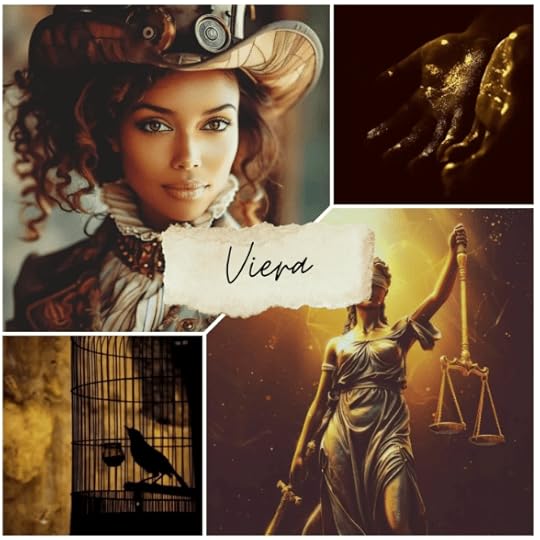
SRS: Right. So it wouldn’t… It’s not necessarily a spoiler, because I actually have had readers who read the Blurb, and they’re like, how does one go from a slave to suddenly being in one of the higher classes? And it’s to do with her family. Half of her family are highborns, the other half are slaves. And she reaches a point in her life where the puppeteer at the head of her family is no longer there to pull the strings. Somebody else comes into power, and they give her that freedom and pull her back into where she technically should have belonged in the first place. But ultimately Viera was meant to be born a highborn. She was never meant to be born a slave. But readers understand how that happens. So it’s unfortunate that she has been raised on the shittiest side of society, and only learn about her relatives later on.
And they’re in this higher society, and it’s quite nice, because, as I said, this whole bond that I give my characters is that her cousin is in that higher society, and he treats her no differently. He becomes her best friend, her brother, her, her everything. And it’s through him that she’s able to get back into that highborn society, and what I like about her at that point where she is a highborn is, she isn’t necessarily… She’s not happy necessarily where she is. She doesn’t conform to highborn rules as such. She doesn’t have slaves of her own. She actually pays a lowborn to take care of her manor. So she’s she’s kind of like separated, and I think other highborns look at her, and they don’t fully accept her, because they’ve always seen her as she’s a slave, and now she’s a highborn. She doesn’t belong.
And she kind of separates herself from that, and doesn’t like. I said she doesn’t conform to their rules, but she’s kind of helpless because she’s in this status now, and she kind of had to accept things as they are. And she can’t fully be herself, and it takes for Kennedy coming back into her life for him to help her see, you’re not happy, and you’re not going to admit that you’re not happy. And what is it going to take for you to see that you’re not happy? And he’s kind of giving this foreshadowing? And he’s trying to warn her as much as he can, that the world that you’re living in is not as you see it.
The pride that she takes in being a Badge, because she’s also highborn, but she’s also a Badge, and that’s her pride and joy. She believes fully in justice and criminals getting what they deserve. And she’s blind to the corruption in the, in the police department, in the city, [and] to the corruptions of highborn. She’s completely blind to it.
She’s not been necessarily exposed to that, but it takes for a pirate to come along to help her see things, and unfortunately bad things happen, and it does take huge catalyst for her to be like – for all the blinders to come off, and for her to be like what the fuck is going on? Have I really just been here for all these years, not seeing what the fuck was going on, and unfortunately, you know she reaches that point where she has to make a choice.
But she has to go about it in a very diplomatic way. She can’t just be like Kennedy, who is a free spirit and does whatever the fuck he wants, because that’s Kennedy. Kennedy’s impulse, and he doesn’t give a fuck. He will do what he believes. Viera can’t. She’s very very restricted in that. So they are really opposites.
And yeah, so she has to. She has to really go through a huge, a huge turning point in her life to help her come to some realizations and hard truths.
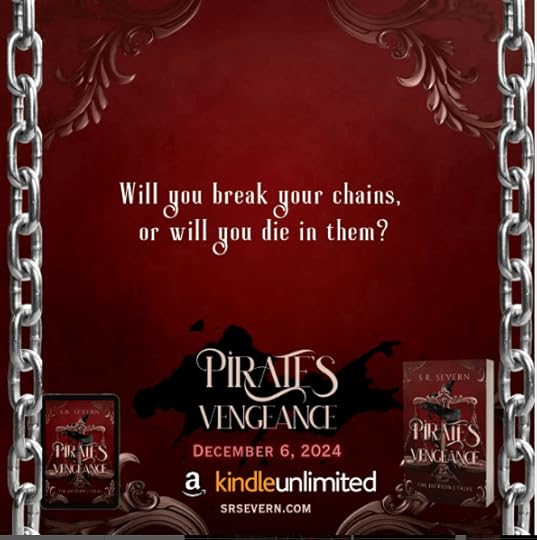
CMR: I just, yeah, I just really love that. The kind of the nuances of the characters. And then, like the journeys that they go through, and the development and all of that. So yeah, really excited for the future of those. And I really like it when characters like wait what the fuck and kind of wake up to what’s been going on around them and like, have that kind of epiphany moment of like, oh, no.
SRS: I should probably add, because I’ve spoken a lot about Viera, and not necessarily a lot about Kennedy, but in that respect, to mirror what she goes through, Kennedy also has to go through his own realizations about highborns. He has his own hatred towards highborns. And bad things happen to him that solidify those beliefs that all highborns are awful human beings, and they basically don’t deserve to live, but because of his feelings towards Viera in the position that she is now in, he battles with that.
He battles with his emotions, and he feels anger towards his feelings towards her as a highborn. He he cares about her, but he’s like, but she’s chosen to be this, and I can’t accept that, and I’m struggling with that. And she tries to tell him, look, not all highborns are bad, but he’s just like well, I’m not going to believe what you’re telling me.
But again, similarly to him, he goes through his realizations, too, and he has to go through that whole rewiring of his mindset or his attitude towards that class of people. So they both go through trying to navigate through their prejudices, I suppose, against their classes. Yeah.
CMR: Yeah, I like, there’s a difference in there between thinking like, okay, the system is bad, and the system needs to be completely dismantled, versus every individual within this system is a bad person and needs to be put against a wall and shot. And they’re actually, if you’re in this class of people, you’re not a person anymore, and I don’t think of you as a person, and I’m taking away your personhood because I hate you.
SRS: Yeah, basically.
CMR: I think that’s a real life mindset that people do have to grapple with at some point. So, I think that’s an interesting – that kind of makes it more real and like more more impactful as a character arc. And like, yeah, I think that’s really interesting.
Yeah, cool. Thank you so much. Can you – before we go, can you tell us more about your future plans? Anything to look out for?
SRS: Yes. So the second book in the series releases on the 6th of December. And I do have 2 more books planned that will feature Kennedy and Viera again. And then I do know that book 5 will feature a new couple within the universe.
But yeah, I can’t say when those books will be out, but it is something that I am working towards, now that the second book is done. For any readers interested in reading Pirate’s Vow I do have to give a heads up that it does end on a cliffhanger. So, Pirate’s Vengeance, which is Book 2, takes place directly after the events of Book 1, and that doesn’t end on a cliffhanger. So you don’t need to worry about that one.
But yeah, so yeah, that’s basically what I have in the works. I suppose, for 2025 and 2026. So we’ll see how that goes.
CMR: Cool. Where can we find you about your social media? Newsletter, website?
SRS: I can be found on Instagram, and I have just recently started TikTok, so I can also be found on there. And then there’s my website that people can read my blog. And I post here and there updates on what I get up to.
CMR: I’m going to put all the links in the Transcript. I will put all the links in transcripts, so people can find you, and the transcript is going to be on cmrosens.com. So you can come over and find that whole [tran]script, and scroll to the end. You’ll find all of Sab’s links and links to the books and everything in there for you.
Thank you so much for coming on the show, that’s all we’ve got time for. So we’re going to wrap up now. But yeah, thank you so much for being here. That was really interesting.
SRS: Thank you for having me. It’s been an absolute pleasure.
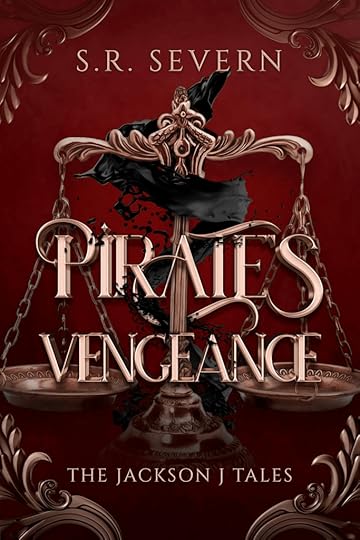 Get Pirate’s VengeanceLike This? Try These!
Get Pirate’s VengeanceLike This? Try These!
April 18, 2025
Author Spotlight: C. Lenz
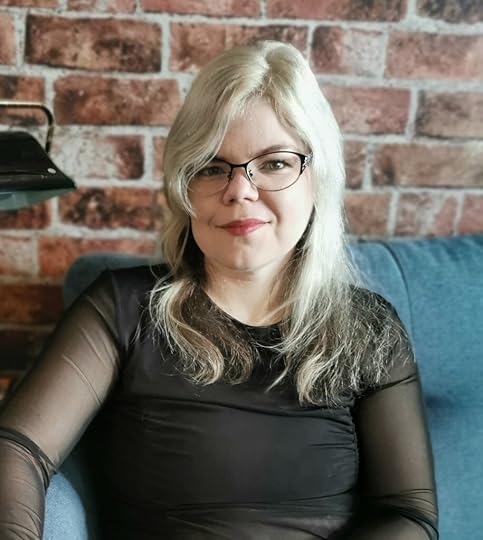
C. Lenz (she/her) is a writer, scientist, and odd little thing. Her stories have appeared in Metaphorosis, Fanatical Magazine, and on the NoSleep Podcast, among others.
She was and honorable mention in the 2023 Hamilton GritLit short story contest, and her debut novella, Thyrst Festival, was released in 2024.
She lives in Hamilton, Ontario, Canada with her wife Zoey.
Author Links:
Instagram: @sealenz
Threads: @sealenz
Get Thyrst Festival: Amazon Link
Free Stories: linktr.ee/sealenz
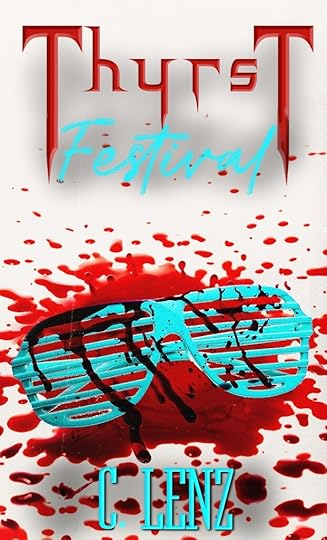
What is your favourite creature feature, and/or your favourite monster-slasher trope?
I love whenever someone thinks they can control the monster or use it for profit. Think Umbrella Corp from Resident Evil or Weyland-Yutani from the Aliens series wanting to use monsters for military applications. Yes, the spectacular backfiring of that idea is totally predictable, but when you look at the kinds of environmental destruction that venture capitalists invest in, the staggering lack of foresight is almost realistic. The attitude of “yeah, this is a bad idea, but I’ll be out of here before it’s a problem,” was definitely a bit of an inspiration for Mitchell, one of the villains of Thyrst Festival.
Tell us more about your book, Thyrst Festival. What inspired this story, and what inspirations might readers pick up on as they read?
I’ve always had a fascination for con artists. Obviously Fyre Festival was a huge inspiration for Thyrst Festival. For a while, I was watching and reading everything I could about it, before moving on to other recent stories about con artists and scammers like Anna Delvey (Inventing Anna) or Elizabeth Holmes (Bad Blood by John Carreyrou).
I was obsessed with the type of person who builds this elaborate lie. Do they think it will work? Do they think they’ll stay far enough ahead of the lie to keep it going indefinitely? Do they even know they’re lying?
I started out wanting to do something where the main characters know the antagonist is lying and have these kinds of questions.
The story I had planned would have been much shorter and much more like a dark comedy take on The Most Dangerous Game by Richard Connell, (and I might still write it at some point). I was also, at the time, working on a horror anthology I was planning to call Eat the Rich, with a focus on class warfare and conspicuous consumption.
Thyrst Festival was meant to be a short story within that anthology before it, y’know, got to novella length and I realized it stood very well on its own. (I also had a couple of the other intended stories, Confession and The Fishbowl, published on the NoSleep Podcast and Nobilis Erotica.)
Thematically, Thyrst Festival is about old money vs. new money, and how there isn’t much of a difference when they’re all vampires.
Can you tell us about your own festival-going (or gig/concert) experiences? Have any of these made it into the book?
I’ve been the first person (or at least part of the first group) to get to a music festival before, and I definitely used that for the vibe of what we see of Thyrst Festival.
It’s an interesting experience to sit on a blanket in a more-or-less empty field while surrounded by the structures of an outdoor concert, but none of the vendors are really open yet and the show hasn’t started.
It’s kind of relaxing but also really weird. You’re looking at this big stage and scattered booths, and you see some staff speed-walking around in the background sometimes, and you’re just wondering if everything’s still on track or if everyone is back there putting out some kind of fire. That uncertainty and lack of behind-the-scenes information, as an audience member, was a really fun flavour to add to a horror story.
How did you develop your protagonist and get into her head, what is your character-development process like when you’re drafting? Did she turn out the way you planned, or did she surprise you?
When I’m outlining a story, I mainly start with the plot and I’ll have a rough idea of who the character needs to be in terms of backstory and general personality in order for the events of the story to make sense. When I actually write the first draft, I’ll usually find the characters by letting myself dip more into what their thoughts would be about the things happening around them. In the case of Grace, the main character of Thyrst Festival, she is a personal assistant who’s ended up at the festival because she’s working for an influencer.
When I was coming up with the major plot beats, I more-or-less imagined her as needing this job to pay student loans but also used to being surrounded by rich people with trust funds, so she’s also usually the first person to actually address an issue rather than try to delegate. At that early stage, I was only thinking of the reasons for her to be there and why she would be the right character to follow.
When I actually began to write the first draft, I started to think more about how she would feel about where she is and who she’s with. I didn’t want her to strongly resent the people around her, because I felt that would feel too negative, but I also didn’t want her to be uncritical and feel like a long-suffering doormat. In trying to balance that, I ended up adding a bit more of myself than I maybe should have, and gave Grace a lot of morbid curiosity early on about how exactly Thyrst Festival is going to fall apart.
How do you build tension and suspense – what techniques do you use, and what’s your favourite way to elicit dread in your readers?
When I’m writing stories with a lot of suspense and action, I find it’s important to think about how fast things are happening. When you’re coming up on a reveal or turning point, you want to start drawing things out before suddenly hitting the reader with some big realization.
I find you can slow things down in a really effective, tense way by playing with the level of detail of the image you’re creating.
For example, if you want your main character to, say, stumble on a den of vampires, you can make the moment before the truth comes crashing in take a little longer by giving the POV a laser focus. Zoom in on little, out-of-context details to build up the image bit by bit, before throwing the big picture at the reader.
Share some reader responses to Thyrst Festival and let us know what they think!
I’ve been getting a lot of good reviews. Something I was proud to see come up was that I really de-romanticized vampires. They’re definitely more monstrous than how I think most media portrays them.
Most of my friends and family have also told me that they read it in one sitting.
Obviously as a novella it’s on the shorter end, but I’m very happy that people are into it enough to just finish it in one go.
I was also going for “beach read,” so that’s perfect!
 Like This? Try These!
Like This? Try These!
April 16, 2025
Audio Release for Yelen & Yelena Chapter 12: Fever Dreams
The audio is now out for Chapter 12: Fever Dreams. Brace for this one!
Yelena succumbs to the rot, but is Yelen’s blood really a cure?
CWs: emesis, fever nightmares involving a lot of mycelial body horror, and grim flashbacks of the time of the dead gods.
Music Credits:
Kevin McLeod (incompetech.com) Licensed under Creative Commons: By Attribution 4.0 License creativecommons.org/licenses/by/4.0
Intro/Outro:
Quinn’s Song: The Dance Begins
Soundtrack:
SCP-x4x
Redletter
Morgana Rides
The Stages of Grief
Midnight Tale
I used Yelena’s fever as a way to explore the idea that dreams carry memory in the way that wind carries warnings. We’ve already seen this with Yelena and Velna sharing a dream-memory nightmare, and I wanted to use this chapter to return to that.
When Velna shows up in Yelena’s dream and asks, “Where are you?”, she might actually be dreaming herself, and the dreams crossing over. But also I wanted to explore the idea of what happens if you have the rot inside you, the essence of the dead gods – what memories does the rot itself hold?
So you have this body horror sequence of extreme acts of torture and abuse, self-destruction, and so on, all in the service of divine access.
Yelena is stuck in these nightmares, first watching, then participating.
I’m hopeful readers will be able to see this is not a moral judgement on Yelena or any of the people she sees in the nightmare – it literally isn’t, it’s simply a glimpse back in time to the way things were, and Yelena is trapped in the nightmare realm for a time witnessing them.
You will find out more about the third thing, water carrying laughter, in the next chapter!
April 11, 2025
Author Spotlight: Arden Powell

Arden Powell (they/them) is a queer indie author and illustrator whose books include The Faerie Hounds of York, the Flos Magicae series, and their short story collection, The Carnelian King and Other Stories. A nebulous entity, they live with a senior rescue hound and an exorbitant number of houseplants, and enjoy the company of both.
Author Links:
Bluesky: @ardenpowell.bsky.social
Website: ardenpowell.mailerpage.io
Itch Shop: ardenpowell.itch.io
Patreon: patreon.com/ArdenPowell
Chapter 1 of The Black Knight Saga Webserial (free public post): patreon.com/posts/ch-1-sir-black-112293087
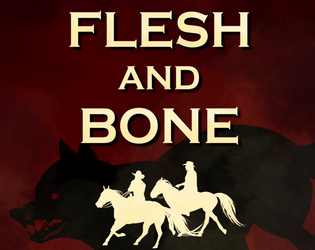 Get it on Itch
Get it on ItchLet’s talk about your latest release, Flesh and Bone. This one is a short, standalone mm horror-romance novella set in the Canadian Wild West of 1889. What inspired you to write this story in this setting & time period?
I haven’t written a western before, and I’m always drawn to new settings. Westerns are so evocative in their sense of time and place, and they lend themselves to horror and romanticism equally well. I wanted to set it before the 1900s to keep it from feeling too reachable.
After introducing the real-life Canadian outlaw Sam Kelly, that narrowed the period to before his career took off in the 1890s.
The Canadian setting wasn’t originally planned. I had written the beginning and some of the climax, then set it aside for a few years. Returning to it at the end of 2024 in the mood to work on a horror story (for some mysterious reason), I decided to set it in Canada as a result of an unprecedented flare of patriotism (again, for some mysterious reason).
There was no reason not to set it in Canada when our prairie provinces are part of the historical Wild West. Going forward, I plan to set more of my stories in Canada unless I have a compelling reason to believe that the story would work better elsewhere.
Tell us about your MCs – introduce us to Everett and Marshall, and let us know what to expect from their dynamic!
Everett and Marshall are childhood best friends who grew up together. As a teenager, Everett came to work on Marshall’s daddy’s cattle ranch, and now as adults, they spend their days together on the range. Everett is reserved, fond of Whitman and Shakespeare, while Marshall is more outgoing and sure of himself. They are both gay, though Everett is keeping that a very closely guarded secret.
Marshall is discreet about his own liaisons, but he is infinitely more comfortable in his own skin, while Everett is afraid of his own desires.
The events of Flesh and Bone commence following a moonlit tryst, which they each regret for vastly different reasons; Marshall is quietly pining for more, while Everett is convinced their encounter woke a devil that is now stalking them for their sins.
Despite their differing attitudes towards their own sexuality and each other’s expression of it, they would absolutely die for each other. And that commitment is being put to the test.
What can you tell us about Canadian werewolf lore, and the wider lore you drew on for this story?
As far as Canadian werewolf lore goes, I think we (and I mean the white settlers) mostly just carried the European traditions over rather than originate our own. I avoided any deliberate allusions to Native American mythology, as I don’t feel that’s my place to explore.
One could draw parallels between the monster in Flesh and Bone and the w*nd*go; that’s not intentional, but maybe unavoidable when talking about hungry supernatural beings of North America.
The werewolf in my story was actually inspired by a horror movie called The Curse (2021), in which the monster is cut open to reveal the cursed human trapped inside. The movie itself was neither good nor bad enough to recommend, but that specific image stayed with me.
I wanted to use my werewolf not just as a metaphor—werewolves traditionally make great metaphors for lots of things, like puberty or violence or sexual urges—but as a very literal manifestation of shame: specifically, internalized homophobia.
Flesh and Bone is less an exploration of any specific folklore than it is a character study, and what the werewolf represents to this one particular man.
How did you use Gothic tropes and create a Gothic space from the Canadian landscape for this novella?
There are three Gothic settings that I love most: haunted houses, the Deep South, and desolate wilderness.
Flesh and Bone falls into the latter camp, and Canada has so much wilderness.
The isolation of the 19th-century Prairies, far removed from any settlement, lends itself beautifully to both horror and to the sublime.
Travelling with nothing but their cattle and horses for company, in the middle of the night with no light but the campfire and the moon overhead, cowboys could spend days or weeks on the range without any human contact except each other.
Adding the survival-horror element of the monster and a grievous injury, on top of already watching for wild animals, outlaws, or a bad turn in the weather, immediately makes the setting claustrophobic and deadly.
The story could have done away with the supernatural elements altogether and felt much the same.
My monster isn’t any deadlier than a grizzly bear attack in the Alberta foothills, and Everett’s paranoia about its nature being that of the devil could be attributed to his fever combined with his internalized homophobia. The landscape felt really effortlessly Gothic, as if it was just waiting for me to set my story there.
What are the main themes in Flesh and Bone, and how did these come about – were they planned or organic as you drafted?
Flesh and Bone’s theme is one of guilt, shame, and self-loathing. Writing an historical gay romance leaves an obvious open door for the exploration of homophobia, either culturally or internalized, which I’ve touched on in my other Gothic books as well. I knew going in that, no matter the horror, the romance required a happy ending, though Marshall and Everett have to go through hell to earn it.
If Everett was to get his romance, he had to overcome his shame surrounding his sexuality first. He also had to overcome a werewolf. Because it’s such a short novella—a novelette, technically, though no one really uses that term—I combined his internal struggle and his external antagonist, resulting in this ragged, relentless beast born of his own body and worst impulses. It felt very organic, though I hope it looks meticulously planned. The shorter the story, the less likely I am to outline it beforehand, and the more organically it comes together in early drafting.
What are your favourite reader responses to this novella so far?
I’m touched by the readers who have commented on the tenderness of the romance, which I was worried would get buried under the body horror and content warnings. I’m very glad people are connecting to the romance, and that it’s not being overpowered by the horror aspects. It ends in hope and healing, and I want readers, especially queer readers, to have that right now.
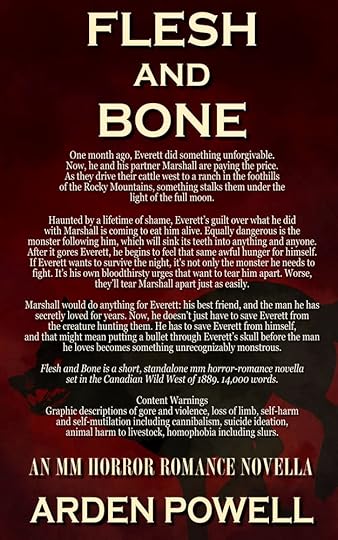 Like This? Try These:
Like This? Try These:
April 9, 2025
Audio Release for Yelen & Yelena Chapter 11: The Chained Library
Yelena is chased into the Chained Library, but the fun and games get darker, and they make a disturbing discovery relating to the Mortress and her realm. To learn more about the real life chained libraries that inspired this section of worldbuilding… read on!
CWs: monster smut with primal play elements, reference to ritual self-sacrifice.
Music Credits:
Kevin McLeod (incompetech.com) Licensed under Creative Commons: By Attribution 4.0 License creativecommons.org/licenses/by/4.0
Quinn’s Song: The Dance Begins
Achaidh Cheide
Morgana Rides
I really enjoyed my tour of Hereford Cathedral’s chained library a few years ago (pre-COVID). Chained libraries were to prevent book theft, and were most prevalent between the 16th and 18th centuries.
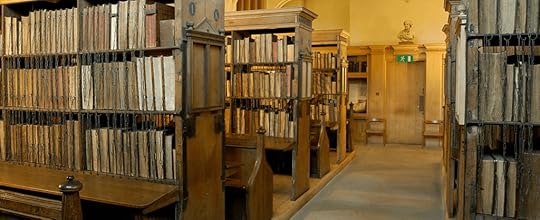 Hereford Cathedral’s Chained Library, restored to its arrangement from 1611 to 1841.
Hereford Cathedral’s Chained Library, restored to its arrangement from 1611 to 1841.St Wulfram’s Church in Grantham, Lincolnshire is home to the Francis Trigge Chained Library. You can see the chains here are a bit chunkier, and for Yelen’s library I was imagining something like this.
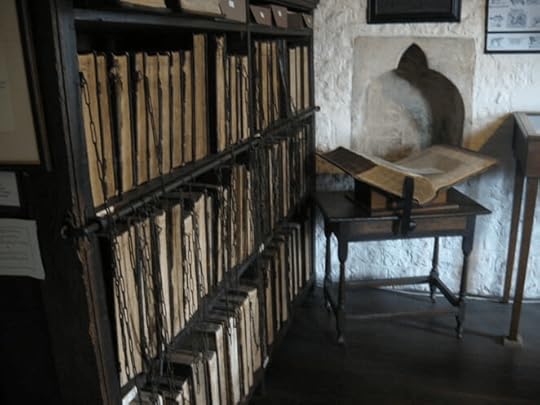 Image from: https://europeupclose.com/article/discover-the-last-chained-libraries-in-england/
Image from: https://europeupclose.com/article/discover-the-last-chained-libraries-in-england/The books are held in place by the chains, so if you don’t put them back in the correct slot, the chains will get tangled up. The binding is attached to one end of the chain, and the other is locked onto the shelf, with a good length of chain to allow you to pull the book down to a desk height and read.
As Yelen is roughly 17thC to Yelena’s very early 19thC in my magical equivalent world, this would have been peak chained library time, and it was also a wasted opportunity to not play with the chains in some sort of sex game, since that’s basically all they do together (and the library will reset at sunrise, so nothing they do actually matters).
Listen to Dr Rosemary Firman on the History West Midlands website talking about Chained Libraries.
April 8, 2025
New Release: Birds of a Feather with Exclusive Short Story
Finally: Birds of a Feather (2021) is now available in print format, which includes slice-of-life 8K short story, First Christmas, in the back.
Amazon only.
I’ve also expanded the eBook release to this website’s shop, and my Itch shop too!
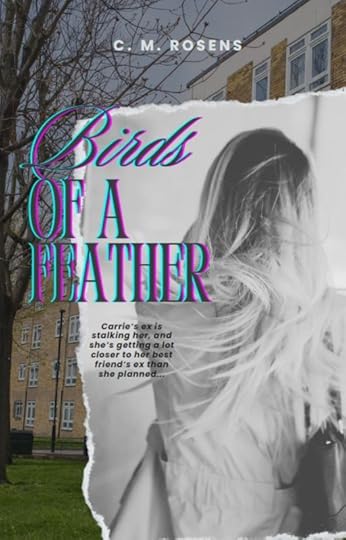 Print Cover
Print Cover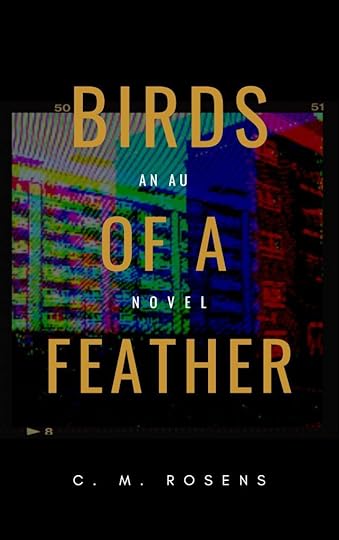 eBook Cover
eBook Cover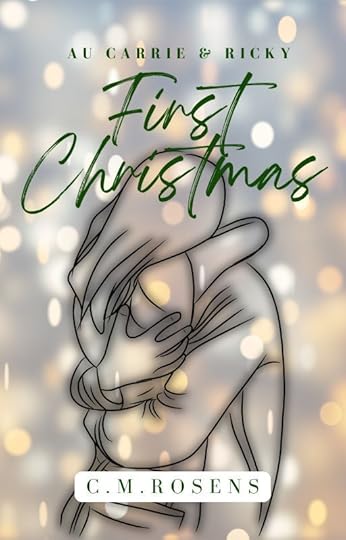 eBook cover
eBook coverBirds of a Feather was a Ko-Fi exclusive novel I wrote in 2021. It is a queer ace romcom for fans of British comedy-drama Brassic and The Crows by C.M. Rosens, and is now available on Itch with First Christmas, an 8K short story I wrote for Ko-Fi members in Dec 2024.
If you’ve ever wondered what The Crows would look like as a contemporary romantic comedy-thriller set on a council estate in a small town, with no magic or eldritch horror… this is how it turned out.
Ricky is still sex averse, still ace, and still some kind of aromantic/greyromantic/quoiromantic, and there is still an intimate but non-sexual queerplatonic endgame. Without the same kind of trauma and better socialisation, however, he has experimented more widely, and both he and Carrie are canonically bi (bi-experimental in Ricky’s case, bi-attracted in Carrie’s, as she is still both allo-romantic and allosexual).
The novel features very strong language, messy nights out, a lot of fry-ups, and a very good doggo to whom nothing bad happens.
Ricky, a depressed and self-employed single dad to an elderly St Bernard, and the only member of his family with a legitimate business, just wants to get his van fixed so he can start work for his ex, Raven, and redeem himself.
He could do without war with his rivals the Pierces, his dodgy cousin’s various schemes, or any more personal drama, but life has a way of kicking you up the arse when you’re down. Then he meets Raven’s new friend, and things take an unexpected turn…
Carrie, a repressed and anxious woman struggling out of a toxic relationship, has just been made redundant, and her only real friend is her hot Goth work-crush, Raven (she/they), who gives her the strength to leave her cheating, abusive boyfriend, and a place to crash.
The last thing she needs is any more chaos or complications, but then Raven’s ex Ricky shows up to renovate Raven’s house, and Carrie finds herself pulled into the orbit of a man with criminal contacts who can make people disappear – and when her ex won’t leave her alone, things begin to escalate…
Read a free sample in your browser: read.bookfunnel.com
Buy the combined eBook from this website directly
(Apple Pay and Google Pay enabled):
cmrosens.com/product/birds-of-a-feather-first-christmas
Buy the combined eBook from Itch (PayPal enabled):
cmrosens.itch.io/birds-of-a-feather-first-christmas
Buy the eBooks from Ko-Fi on their own (PayPal enabled):
Birds of a Feather on its own: ko-fi.com/s/561b59908b
First Christmas on its own: ko-fi.com/s/1f5191e1e4
April 7, 2025
Author Jelena Dunato on Croatian History, Folklore, and Writing Fantasy

Jelena Dunato is an art historian, curator, speculative fiction writer and lover of all things ancient. She grew up in Croatia on a steady diet of adventure novels and then wandered the world for a decade, building a career in the arts.
Jelena’s stories have been published in Beneath Ceaseless Skies, The Dark, Uncharted and Small Wonders, among others. She is a member of SFWA and Codex. Her novel, DARK WOODS, DEEP WATER, was published by Ghost Orchid Press in September 2023. The audiobook was produced by Spotify in 2024. Her new novella, GHOST APPARENT, came out in September 2024.
Jelena lives on an island in the Adriatic with her husband, daughter, and cat.
Listen NowAuthor Links:
Website: jelenadunato.com
Linktree: linktr.ee/jelenadunato
Instagram: @jelena_author
BlueSky: @jelenawrites.bsky.social
X/Twitter: @Jelenawrites
GoodReads: goodreads.com/jelenadunato
Amazon: amazon.com/stores/Jelena-Dunato/author/B0BVW3C66S
IntroductionCMR: Hello, and welcome back to Eldritch Girl, and I’ve got Jelena Dunato here with me. Jelena, would you like to introduce yourself and tell us a little bit about the extract you’re going to be reading for us.
JD: Okay, so hello. My name is Jelena. I’m a writer from Croatia, and I write mostly fantasy, dark and historical fantasy, and horror. And my writing is often influenced by the history of the Eastern Adriatic, and you know, Croatian folklore. My own tradition, my own history. I have published quite a few short stories so far, and some longer works.
And today we are going to talk about my novella, Ghost Apparent. And I’m going to read you a few pages from it. It’s a novella that was published in 2024, and it’s a dark political fantasy about one woman’s rise to power based on the history and folklore of the Eastern Adriatic.
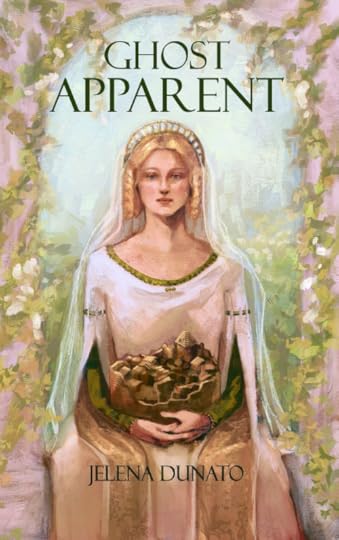
Extract from Ghost Apparent by Jelena Dunato
When her father is killed in a bloody coup and her uncle seizes the city, Orsiana pleads for help with the only power still willing to listen, unaware that the gods will use her as a pawn in their own game.
Thrown back on the streets of Abia, armed with the gods’ double-edged gifts, Orsiana must thwart her uncle’s plans and learn what it takes to rule a proud, stubborn city that thrives on artifice and wit.
She will plot, fight and use lethally tuned verse to stir a rebellion. But just when her uncle’s Machiavellian schemes start to topple, a new player will enter the game, and the gods will raise the stakes. It’s easy to fight an enemy you hate, but how about an enemy you fall in love with? If she wants to win, Orsiana will have to risk the last precious thing in her possession: her heart.
A story of revenge and recovery, Ghost Apparent blends the history and folklore of the Eastern Adriatic with the bloody treachery of the Renaissance courts and is a perfect read for the fans of dark political fantasy.
Ghost Apparent was published by Ghost Orchid Press on 24 September 2024.
It’s available in ebook, paperback and hardcover on their website or here.
JD: So in her quest to win her city back, Orsiana meets different gods, and this is her meeting with Veles, the trickster god of the underworld.
Interview
“Little Orsiana,” a voice says and an eye opens among the waves of gold, as big as her head, bright yellow with a slit black pupil. A snake’s eye.
She stands before it, a terrified rabbit frozen with fear.
The enormous snake moves with a sound as smooth as satin sliding off a rack, until its head, as large as an ox, almost touches Orsiana. “What are you doing here?” the god asks.
Despite praying for help in the attic room, Orsiana is just as stunned as when she met Korab. Being plucked out of the human realm and thrown before a deity is not an event one can prepare for in advance.
“O, cunning Veles, the cleverest of gods … I don’t know,” Orsiana answers in her head, her voice still gone. “I was praying for an escape, and then—”
The liquid blaze of the god’s eye burns her like the sun. “I’m not asking how you got here, I know that. You’re here because your shrieking woke me up, because you’re falling through the layers of time, tearing them and leaving a hole that hurts like a knife-wound. Every god hears you now, but I was the closest. So, tell me, what are you doing here? What do you want?”
This time, Orsiana is better prepared. “I come to you seeking help,” she pleads.
Veles hisses softly and stares at her with his unblinking eye. “I am hungry,” his voice echoes inside her skull, “and you look deliciously tender. Should I eat you or should I hear you out?”
Her body trembles but she meets his gaze directly. “I’m all bones, o mighty Veles, you wouldn’t find me tasty.”
The god scoffs. “You’re a funny little thing. Tell me what you want.”
“I would like my voice back.” There are many things Orsiana wants, but she’s learning quickly that it’s best to be short and precise with the gods. And perhaps not too greedy, or the price might be too steep.
“And why do you need your voice back? You shriek loud enough without it.” A forked tongue flickers out of the god’s mouth and disappears again.
“I need my voice to tell people what happened.”
“Why?”
“So I can avenge my father’s death.”
The great coil rolls towards her like a golden tide. “Is that what you plan to do? Run around and cry murder until someone sticks a knife in you and makes you shut up?”
A pang of fury prods at her chest, but she’s still collected enough to know it would be unwise to quarrel with a god. “I—no, I’m not going to do that. I will be careful.”
“And do what?”
“I don’t know yet!” She balls her fists in exasperation. “Why does it matter to you anyway? I am just one powerless girl. What difference does it make to you if I succeed or fail?”
“It makes all the difference in the world, little Orsiana,” the great eye blinks slowly, “whether you rule Abia or your uncle does.”
JD: Okay! That’s it!
CMR: Yay! [laughter] I love the cliffhanger.
JD: Oooh!
CMR: I really love that extract. Thank you for reading it. So I was thinking we could launch in from here to talking about the folklore that you used and the concept of the folklore.
So let’s start with what inspired you to use the Croatian folklore, especially Veles, the god, for your novella in the first place.
JD: Well, I’ve always been a fan of different mythologies since I was a child, I liked stories about gods and heroes, and when I started writing fantasy, I mean, the obvious path is is to go to your own culture and your own tradition. And with Croatian folklore, the thing is, it’s mostly based on oral traditions.
So we have very few written sources, and mostly it’s just legends which are pretty vague. So you have gods, and you have mythical creatures and their powers, but you don’t have much in terms of canon, and so that that gives you huge freedom as a writer to invent new things, to write new stories.
So basically, you’re not limited, and you know you can really, you know, use the tradition and the legends, you know, but turn them into something completely new. And, for example, in this scene, we have Veles, who is a trickster god, but he has, like so many different qualities in in these legends. So he’s the god of earth. He’s the god of of animals, livestock and the underworld, and he’s also the god of magic and music, which gives you like a huge freedom to explore all the possibilities with him as with other gods. I have the Goddess of Love appearing in the story. I have the the God of the sea. And of course the Goddess of Death. And they’re all based on Croatian folklore, but also they are creatures I’ve created out of my imagination and other myths that I’ve read, because obviously, most gods here are archetypes, they appear in many religions. So even if my readers are not familiar with these particular personifications of natural phenomena, they will be familiar with the idea of, I don’t know, the Goddess of Love, because she appears so many times in so many different religions.
CMR: I really love the way that you’ve described Veles as well, like you’ve chosen the snake version of him, and I think he also like, appears as a dragon in some, and like a bear, or something as well. So why did you pick the snake in this particular scene?
JD: It just fits very well in this, because I wanted to emphasize this trickster angle. And I always, you know, I always saw snakes, as you know, sneaky and tricky animals. No offense to snakes. And also like it’s happening underworld, they’re in a cave. And I just thought that if I were in a cave, what would be the most the scariest thing, the scariest animal, I could meet there.
I mean, obviously, some people would say dragon, but a dragon is a mythical creature, and to me dragons seem like something, you know, noble and powerful, and I wanted something frightening and something that you know appears out of the dark passages, and just I don’t know. Just looks like something that could actually devour you if you’re not very careful.
I mean, the thing is, in real life I’m not even afraid of snakes. I actually like snakes. I think they’re very cute [laughs]. But I thought that, like, a huge massive snake, was a really good personification here to to appear before Orsiana.
CMR: I really love it. I love snakes, too.
[laughter]
I was just thinking about the connection between snakes and dragons as well, like in English folklore we have wyrms, they fall under the dragon category. So I was like, yeah, that makes a lot of sense to me as well.
JD: And also, I mean, dragons are overused in fantasy. So I didn’t. You know I didn’t want to be, you know another person who writes about dragons just because dragons are cool and everybody wants to have them. I actually thought that, you know, a snake was a much better idea.
CMR: I think you’ve got the link as well like the cunning snake in the Garden of Eden. I think people coming from a Christian cultural background might make that connection as well.
JD: Could be. But this, you know, Slavic folklore definitely predates Christianity.
CMR: Yeah, yeah, yeah, no 100%. I’m just thinking, like, if people aren’t particularly familiar necessarily with the mythology, that’s maybe where their mind would go. But it makes sense for a trickster god, I think, because it’s just a very common trope for a snake, not a trope, but like it’s common… It’s like a common personality archetype for a snake. Tricky.
JD: Yeah.
CMR: And when you were designing other gods that you’re using in in the novella, like the goddess of Love, and, like, Morana, the goddess of Death, who is one of my favourites, and appears in another novel that you wrote, which is also one of my favourites, yeah, what were you thinking? And how are you designing those gods as well?
JD: I adore the idea that the Slavic goddess of death is a woman, because so often, in so many mythologies there are male gods, in Greek mythology, in Roman mythology, and I always thought that death should somehow belong to women. Because obviously they give life. But also when you think about ending life — so if it’s not in some, you know, brutal murder sort of way, so if it’s just like a normal ending of life, it’s usually the women who are present there, and they’re usually the ones who take care of the people dying. So to me it was completely logical that the goddess of death should be a woman, and also I very much like the the connection between Morana as a goddess of death, and also the goddess of Winter, and also the goddess, not exactly the goddess of water, but there is this, you know, tradition of drowning Morana at the end of winter. Sort of to invite the spring in, and I found in some sources, you know the legends, that the people, the sacrifices to her, were also drowned. So there is this connection between water and winter and death that was so appealing to me.
When I was writing Dark Woods Deep Water, and obviously I needed some kind of a deity, it was such a happy coincidence that I didn’t have to invent much because it was already there. I just had to use it, and that was fantastic. That’s the great thing with with legends and with folklore. You think you need something, and you think you need to make it up. But you actually don’t. It’s already there.
CMR: Yes. and I think, like, especially when you’re using folklore, that you know really well, you can play with it in ways that someone who doesn’t know that folklore as well, or perhaps doesn’t understand the culture that it comes from as well doesn’t get. So I think there’s something much more — I don’t necessarily like the word authentic. But do you know what I mean? Like? There’s something a little bit deeper, a little bit richer, with people playing with their own folklore in their own cultural context. So yeah, I really love that.
JD: The readers whose opinion I’m really interested in and really worry about are actually the people who do know Croatian folklore.
CMR: Yeah.
JD: Because, I’m aware that to an American reader or to a British reader this will be, you know, just another story. I mean, maybe a nice, original story, but just another story in a sea of different legends and stories which you can read today.
Whereas someone from my own country they will definitely find familiar elements. And you know, I worry about them finding me inauthentic, or you know, because that that would be the worst thing. If my own countrymen, my own readers, thought that I use those legends, or those gods in a way that’s not fitting, and if they didn’t like it, that would be really bad for me.
CMR: Are there quite a lot of people in Croatia using folklore in this way and using fantasy, because I feel like it’s becoming more prevalent, or there’s a strong trend of this now, I think, but I’m just wondering what the landscape is at the moment there?
JD: Yeah, definitely, because there was like, there’s a huge part missing because a few generations completely missed the connection with folklore and tales, because, for example, I grew up in in an industrial town, and you know, my parents worked, and I didn’t have anyone to tell me all those legends and folktales. I had to dig up books and read about them, because the oral tradition at one point just didn’t continue.
So we lost that part, and I think that now, with many new writers coming in, and especially many new fantasy writers coming in, people are rediscovering their own heritage, because I think that for so long you know, so much of what we read and watch here in Croatia is imported, because, you know, the American culture is so prevailing that most of the things you read and hear is basically American stories. And so I think it took us very long to actually realize that we have our own traditions. We have our own stories, and it’s time to start telling them and writing them down.
I mean, I’ve been in publishing for what? 5, 6 years now, for you know, for serious. And I’m completely aware how difficult it is to have any kind of promotion, any kind of reach, any kind of open door, when you’re an outsider, because it’s a very tight knit community, and it’s a very small world which doesn’t let many outsiders in, and especially if you’re trying to tell about your own culture and tell your stories.
I mean people do like — this is not about the readers, because the readers do like different stories. They do like to to read about different cultures and different peoples and histories.
But publishing is incredibly conservative. And they’re so afraid of letting, not just different stories, but different ways of storytelling, in. It’s something that it’s really hard to break in.
CMR: Yeah, I was also thinking about like the, there was an anthology of Greek mythology based stories without a single Greek author in it.
JD: Yeah, I remember that one. Yeah, yeah, I mean in in some ways, we in Croatia are much more fortunate than the Greeks, because their mythology got retold by everybody but the Greeks, whereas here. I mean, yeah, there were some like really bad examples of using Slavic mythology in books, but not nearly as bad as as Greek mythology.
CMR: I genuinely think, when I was a kid, there were more books about Greek mythology for children than they were about Welsh mythology for children in the English language. That kind of really resonated with me when you said that you grew up in an industrial town, and you didn’t have that oral tradition, you didn’t have anyone to tell you the folktales, and that feels very much like here in Wales as well. Where again we have our mythology repackaged for fantasy a lot.
Welsh, and Irish mythology, and also Scottish as well, gets smooshed together without any kind of thought, and it becomes a very homogeneous mess of “Celtic” in inverted commas, which somehow also manages to exclude Cornwall. But and then, you know, at the same time, you have people trying to recover Welsh history and Welsh mythology and Welsh folklore and use it in different ways and different contexts and things.
JD: When I was growing up, we had only one children’s book of Folk Legends. And I mean, it’s an amazing book. It’s a beautiful book, but it’s just one book, and I hope that there will be more young writers exploring Slavic and Croatian folklore, and more books written because I think if you’re not in touch with your own heritage, if you’re not in touch with your own folklore, I think you lose a huge part of your identity.
I think it’s really important to have these stories, which anchor you in your place, and give you a sort of a place in the world. And I think most of this feeling comes from knowing those stories, from seeing the nature around you and thinking, this is where my ancestors live, and this is what they believed in. And if you don’t know that you have no connection to it.
CMR: Yeah, a hundred percent. I think that that’s very true. And like landscape as well. And language are two really powerful things for me, like when I think about folklore in Wales, it’s always very rooted in place, and also in Welsh. And so my, I kind of grew up, not speaking Welsh, because that was stamped out of my family in the 19th century. And so I also grew up in the coal fields, which was a very multicultural kind of place, where, I say multicultural. It was a mix of like Welsh and English people coming in to do anyone basically who came to work in the mines. And so we — we lost a lot of that [language].
And so where I live, it’s very difficult to find that equilibrium again, I guess, and it’s very difficult to access stuff. It’s a lot easier now because the Welsh government has got a lot more Welsh language schemes, and there are free classes. And there, you know, it’s become a big, a bigger thing. People are sending their kids to Welsh [language medium] schools, even though they don’t speak Welsh themselves. And so we’re recovering like slowly.
Yeah, it’s just one of those things that I think the next generation will benefit from a much richer heritage treasure trove.
JD: We had similar problems with erasing the language, because, you know, the Croatian language became the official language in Croatia in the 19th century, and before that they were, you know, Croatia was divided between several big big powers; the Habsburg Empire, the Venetian Republic, the Ottoman Empire. And so much of what is written about Croatia and about Croatian history and tradition is not in the Croatian language.
And also, there’s the problem with Christianity erasing folklore and old beliefs. Because, you know, Croats were Christianized in the 9th, 10th centuries, and basically everything they brought from their old homeland was more or less erased, so it was only preserved through oral tradition, but as they were mostly illiterate at the time, they didn’t write those things down. So what we have written is written in the Christian tradition, and the old tales were not.
CMR: Yeah, it’s the same for Wales as well, because we were Christianized much earlier than you, I think, with sort of like the 4th century, and Welsh Christianity, back in the day, traced its direct ancestry to John, the beloved Apostle. He was the great granddad of the Apostolic, you know, [succession], And then his, his great great disciple moved over and was a Bishop of Gaul, and then evangelized Wales. And that’s the kind of the heritage that the early Welsh Christians had. But they didn’t write down… We were an oral tradition for centuries. And so by the time we got our tales written down, it was like the 11th or 12th century, and monks wrote it down. It’s interesting from that layered historical perspective, but also frustrating as well.
[Laughter]
JD: Yeah, but that makes it so interesting, because, you know, it’s a curse, and it’s also a privilege, to live in a country that you know, changed rulers so often as we [did]. You have so, so many layers of history and so many different peoples, actually. I mean, I’m writing in the Croatian tradition, and I see myself as a Croatian, but also where I live now, it was Venetian territory for over 400 years. So when I look around, it’s almost all Venice. There is no Croatian tradition here. It’s been Venice.
And also I mean you have Greeks, you have Romans, you have Hungarians. You have Hapsburgs, you have… Even the French came here with Napoleon.
It’s like there’s so many layers of history. And I think that makes it very rich, and that makes it maybe unique, in the sense that when I’m when I say Slavic culture, or when I say, Croatian history, it’s not what you would expect of, you know, a typical, or what an average reader thinks is a typical Slavic story, because it’s not all snow and forests and little villages and things like that. It’s also the coast and the sunlight and the olive trees.
So it’s a very mixed culture, and I think that makes it, of course, that makes it rich, and that makes it such a beautiful playground for ideas and for stories.
CMR: I was gonna say, because in Dark Woods, Deep Water you have that kind of split happening between that gorgeous city that the main characters find themselves in at one point, versus the manor in the forest that’s muddy and creepy and snowy, and the playground of the Goddess of Death. You have, like those two completely different areas. How do you use Croatia as your inspiration for that?
JD: I mean, if you think, especially in Ghost Apparent, you have Abia as a city state. It’s all based on history. If you travel the Eastern Adriatic coast, if you visit Croatian coast, you see so many little walled towns that used to be medieval communes. Which were independent in some way, because, you know Venice allowed you a certain measure of independence. And so you had your own government. You had your own nobility, you had your own, you know, rights. And so I mean, it’s all basically history. So I didn’t have to invent much here.
But, on the other hand, we are also, you know, snowy forests and castles, castles in dark woods. That’s also part of the tradition. So if you go north, if you move from the coast, you will see a completely different history and a completely different tradition. So we are, you know, we are a small country, but we have many different histories here, so I just had to look around. I didn’t have to invent much.
[Laughter]
CMR: Do you find that fantasy is a good distancer for writing about your own heritage and your own culture? Like, if you were writing a contemporary story, would you find that maybe harder to put folklore into a contemporary story in a modern industrial town? Or do you think that would be something…
JD: I’m not really good at contemporary stories, I must say I always liked the sheer scope of fantasy. The freedom that it allows you. To be quite honest, I mean, and I do read contemporary novels, but I don’t think I could ever write one, because to me, you know, writing about life in an industrial town, or writing about a woman living in 21st century Croatia, it would seem… small? I don’t know. I definitely like the idea that in fantasy you can have gods communicating with mortals. You can have legends. You can have curses. You can have miracles, and not just because it’s pretty fireworks, but because it tells the truth about people in another and maybe deeper way.
Because, you know, when you look at the first things that people wrote, when you look at the ways that religions were created, it’s all basically fantasy, you know. But when the first people sat down to write a story, it wasn’t a story about, you know, contemporary people living. It was a story about gods. So I think there’s something that communicates some deeper level of understanding. If you know what I mean, something within us that is true, even if it’s fantasy.
CMR: Yeah, there’s a lot more that you can get at with people if you put them in different circumstances, or you can give them access to an archetype to engage with. And then look at how that works with the themes of the book that you’re writing, but how that works with their character. What does that say about them? How did they interact with that? How does it fundamentally change them?
JD: Hmm.
CMR: And I think, yeah, as you say at the beginning, the gods that you’re talking about are archetypes. And you can do so much with that, and you can fold that into so many different themes and different ways of understanding the world and different ways of understanding people.
So what do you think that the main themes of Ghost Apparent are, and how do the archetypes you use there play with those themes?
JD: I think that the main idea of Ghost Apparent is actually defining who you are, because that’s the whole story about Orsiana. She needs to grow up really fast. She needs to decide what she wants to be, but also, this mythological layer, this layer of gods, what I wanted to show, what I want to show with every story that I write, is that gods are not merely, you know, fairy tales, and they’re not just, you know, those supernatural beings who grant you wishes and give you blessings.
I like the idea of very human-like gods, just way more powerful like. They have all the bad human traits. They can be jealous. They can be wicked. They can be all kinds of things. But they have this power to to influence your life, and then screw up completely.
So I like the idea that every gift Orsiana gets from the gods is also a curse, so she needs to find a way to use those gifts. But also she needs to find a way to fight those curses. And I think that that gives it a sort of a layer of unpredictability which which I find very fun when I’m writing.
I think it makes it much more interesting than you know the straightforward story of God’s gifts.
I always like to write intelligent characters. I don’t like dumb characters. And Orsiana is definitely very intelligent. I also wanted to write someone who sees the situation as it is. Someone who can actually judge the situation. But all their options are bad, and I wanted to see how they fight the results, and how they end in trouble, not because they’re stupid or they make wrong choices, but because all the choices are bad. These are the stories I like to write.
CMR: Yes, I like that.
[Laughter]
CMR: There are no good choices here.
[laughter]
JD: Yeah!
CMR: There is only the least worst.
[Laughter]
JD: Yeah! It’s the same in Dark Woods, Deep Water — My favourite character in Dark Woods, Deep Water is definitely Telani. He’s a reflection of myself. And I like him because he sees everything that happens like he sees the whole story clearly. He has the most precise idea of what’s actually going on, and he can’t do anything about it. And he loses the most, and he can’t do anything about it. So I find those those characters are the best characters to write about, because they’re interesting.
CMR: I was gonna ask, what is your favourite character from Ghost Apparent?
JD: Orsiana would be the the obvious choice, but actually like, if I had to choose one character who’s not her? It would be her father. I think he’s absolutely amazing. [Laughs] I think he’s amazing because he’s flawed. Because he’s doing his best with, you know, with the talents he has. He’s not a warrior, and he’s not a fighter. He’s just a very intelligent and well educated and basically very nice man who is ruling a very dangerous town.
And I like him for it, because in in the end, when we have the man who saves the day? He’s none of that. He’s the complete opposite of Orsiana’s father, actually, and obviously he wins because he’s the complete opposite. But that doesn’t make us like him more. That doesn’t even make me like him more.
CMR: [Laughs]
JD: No, I mean, that’s the important thing to say, because what I want to say — and this is the historical part of this story — what I want to say here is, it’s hard to rule something. It’s difficult to be a ruler, and it’s also it’s lethal as well. And you can be a good man. You can be a very nice, decent, talented, wonderful man, and you will get killed. And also you can be like a complete bastard, and you will win. Because that’s the way of politics.
CMR: That’s the way it works. Yeah.
JD: That’s the way things work. But I wanted, you know, obviously, this, this is a story. This is a fantasy story. This is not, you know, a serious historical book. But I wanted those things to be obvious. That, you know, being nice does not necessarily make you a good ruler, and this is something that Orsiana had to learn as well.
And you know, I like that arc where she actually realizes that she has to be both sneaky and she has to lie, and she has to push people. And she has, you know, basically to survive. Otherwise she would have been killed. And I think this is maybe a reflection not only of our own political history, but also of our current situation as well.
CMR: Yeah. I was just thinking about all the fantasy books where you know that that morally good, upright ruler is held up as like the paragon you know of like this is what you’re supposed to be like.
JD: No, I don’t believe in that.
CMR: No. And like as a kid, I just kind of like lapped that up. And then I learned a tiny bit of history, and I was like, Oh, no, he would have been dead in 2 seconds.
{Laughs]
JD: Exactly, exactly. When I write about people who have power, I always think about, you know. What kind of decisions they have to make in order to, you know, for the whole thing to work. And obviously, you know, as Orsiana learns, sometimes you have to sign the death sentence. You have to sign the death warrant, and sometimes you have to make extremely hard decisions. Sometimes you have to sacrifice people and things. and it’s never a black and white situation, and I think, I mean, in modern fantasy, you have some very very good portrayals of rulers. So I think that maybe you know this idea of a perfect, perfectly good ruler belongs to some, you know, older older…
CMR: Yeah.
JD: I think that now, many writers are doing great things. I mean, we’ve all learned from The Game of Thrones, you know.
CMR: Oh, yeah, for sure.
JD: I find Grimdark fun. But again, that’s not something I would want to write, because, like, even even if I write stories that you know end in tears for most of my characters I still need some kind of hope. I think that, even in the worst of worlds, you have to have something to believe in. Otherwise, you know, what’s the point of telling a story?
And also, this is the wonderful thing about fantasy. There are always heroes. They don’t have to be typical heroes. They might not be what you expect them to be. But you can have like such wonderful stories with people, you know, being their best selves and and showing incredible qualities. And you know, overcoming horrible things. And I think that’s really — because fantasy gives you this scope, and obviously, you can have heroes in real life, and you can have heroes in contemporary stories, but you know, in fantasy you can have heroes with, you know, capital H, like huge big characters.
[Laughter]
But hey, I have a new book. Which is a love story, basically.
CMR: Oh!!
JD: It’s it’s yeah. I mean, it’s fantasy. It’s not Romantasy. But it’s a story of, you know, hope, and loyalty and love. So I’ve written something. Well, it’s also dark, and it’s got, you know, murder and war and stuff like that.
CMR: There it is!
[Laughter]
CMR: I was waiting. I was waiting.
JD: And gods behaving badly, and all – yeah! All those things are still in there. But I challenged myself. I said to myself, because in all the other books, like Dark Woods, Deep Water, and in Ghost Apparent, I’m quite cynical about love, if you’ve noticed, especially about romantic love.
CMR: A little bit.
JD: I mean, I’m not cynical about love in general, but I’m cynical about romantic love, and it usually ends badly. And this time I said to myself, Jelena, you are going to write a happy love story. You’re going to give your characters a happily ever after. And I said, Oh, my God, how am I going to do that?
[Loud laughter]
JD: But I think I’ve managed to do it so hopefully I will find, you know, a publisher to actually publish it.
CMR: What’s it called?
JD: It’s called Love Lethal, Death Divine.
[Loud delighted laughter]
CMR: There it is.
[More laughter]
CMR: Oh, I hope you do. I hope you find a home for that, because it sounds amazing.
After this interview was recorded, Publishers Marketplace announced the deal for LOVE LETHAL, DEATH DIVINE
coming from Dark Matter Ink in spring 2026
JD: This time I forced myself to write the last chapter before everything else. So, of course I changed the details and everything, but I had to have it sketched. I had to say, you know this person comes here, and this person is waiting for them, and they meet each other again, and they get together, and it’s a happy ending, because otherwise I would risk my story leading me somewhere, and you know, characters running wild. But this way, this way, I said, I have pinned down the final scene. I know what it looks like. I know what happens. So everything I write has to lead to that point, and that helped me.
CMR: Brilliant. Romantic love is hard, though. It’s hard.
JD: I mean, in in order to prepare myself for that ordeal, I read a lot of romantasy, and you know, books with happy endings. And actually, I found that I’ve been prejudiced all this time. They’re actually good books.
[Laughter]
JD: Mea culpa. I shouldn’t have doubted them. I mean, millions and millions of readers can’t be wrong, can they?
CMR: Right.
JD: But I did have to sort of change my whole frame of mind, because, you know, coming from dark fantasy and coming from horror into a more romantic, well, happier stories, it was really hard, but I think it was a necessary change. It was something I had to do to grow as a writer, I mean, I’m not saying that I will necessarily continue in that way. But it was, you know, it was a good lesson to learn, and I enjoyed, I really enjoyed writing it and and learning it, and I think I have a good book as a result. So we’ll see.
CMR: I think it’s hard, because romance, especially when you’re writing any kind of romantic plot. It’s got its own set of beats. It’s got its own genre expectations. It’s got its, you know, and I genuinely find it. One of the hardest genres to write is for me is romance and murder mysteries.
And when I find books that I love. They’re almost always Beauty and the Beast stories or Phantom of the Opera stories. Do you know what I mean? Like that sort of dynamic? I love that, but it’s always fucked up. Like yes, into my veins. The problematic shit. Thank you. Yes, that’s what I wanted. But I can’t… When I’m sitting down to write something, and I’m like, no, it’s going to be happy. Everyone is going to be happy. … Oh, maybe he’s like a, maybe he’s an alcoholic, and he’s not quite in recovery yet. And so the problem is him.
JD: No, because that makes it more interesting. I understand you completely. I like fucked up characters, and I like. As I said, I like difficult situations. I like to torture my characters, and also I mean, I have to say, this book does not have romance beats in it. It doesn’t, because it’s not a romance book. So, it has a love story in it, but that doesn’t make it a romance.
CMR: Right.
JD: It’s still definitely Dark Fantasy, it just has a love story in it. And that was hard enough. Yeah, I agree with you. I mean writing straight [as in, Romance as the primary genre, not straight as in heterosexual] Romance with all the beats, all the tropes, I don’t think I don’t think I could manage that.
CMR: I’ve interviewed quite a lot of Romance authors on this podcast for this season, like hats off to all of them. I’m always fascinated with people’s ways of plotting, ways of thinking, when they’re writing books. And I’m just sat there like, this is amazing. Tell me more. I deeply respect when I read a Romance novel that actually made me feel like, Oh, my God! That’s that’s really hot. and like that doesn’t happen very often. And I’m like, Oh, my God, this is like the best book I’ve ever read in my life. Because I don’t know how they’ve done it.
JD: But it’s same with, you know, with other novels, I mean, good books are good books, no matter what genre. So I mean, there are some incredible romance novels. There are some incredible love stories. Just as there are some incredible fantasy books, and there are some which are unfortunately not, so I don’t think it depends much on the genre. I think it just depends on the quality of writing.
CMR: Yeah.
JD: But what I’ve learned as well with this experiment is that you really have to keep an open mind, as a reader as well as a writer. You have to, you know, challenge yourself to write and read outside of your genre, to go into genres that you would usually never pick up, and you know, read the books that you believe are good, and then try and see what they did, what the writers did, that was, you know, that impressed you, that made the book work. And because it’s a different genre, and because it has different expectations, there is definitely a lot to learn.
CMR: Yeah, I, yeah, a hundred percent. I think that’s a really good way of doing it. I think to be a good writer of any genre you do have to read… something. And look at how people pull off what you want to pull off, and you can kind of analyse it a bit and dissect it, and work out what works, what doesn’t work.
JD: It’s much easier to see what doesn’t work, because it sticks out, than to see what actually works, because when a book works it’s seamless, it pulls you in. And you actually stop yourself and think and say, Wow! Like, I’m really enjoying this scene like, what are they doing in this scene? And like, how did they tackle it? and it’s, you know, the the better the writing is, the more seamless it looks. And and you know, the more difficult it is to see the the technique and the skill behind it. And that’s really admirable.
But yeah, I mean, when you write a certain genre, you obviously have to read so many new books in that genre that sometimes you forget that there are other books in other genres. And you know, obviously, everybody’s time is is limited, and you can’t read, I don’t know, 20 books per week, but I think we all should occasionally try and read different genres. Because you can. You can learn so much from them because they’re like a complete new set of skills. That is, for example, required to write a mystery book, or, you know, a romance. So I think there is very much to to learn from the other genres.
CMR: Yeah, I agree. I’m just going to bring it back to folklore really quickly at the end.
[Laughter]
And say, do you have some favourite piece of folklore that you haven’t used in the story yet? Or something that you have used, but you would use again?
JD: Yeah, actually, the tradition that I’m really interested in, and the tradition I really love, is the tradition of the bell men [Zvončari], which is a pagan carnival tradition, where you have men wearing animal masks and usually sheepskins and they carry large bells, usually cowbells, and clubs, and they’re driving away evil spirits, and they’re driving away winter.
Croatian ZVONČARI, Spectacular Wild Men of an Ancient Slavic Pagan TraditionJD: And it’s it’s a very old tradition, but it’s still alive. It’s a live tradition, still happens, and when you see them and I had the, you know, the amazing opportunity to actually see them walking around villages and making this absolutely hellish noise. It’s absolutely terrifying. But also, you can almost believe that there is something you know, sacred and holy about that ritual that they’re actually driving away winter and and they really really look so terrifying when you see them, when you see them in nature, like it’s not the same when you see them in sort of, you know, carnival surroundings. Then they’re just one of the, you know, many masks there, but when you see them walking the country roads and making that noise they’re absolutely believable and true.
CMR: Yeah. Oh, that sounds amazing. Thank you so much for coming on and having a chat with me. Just before we wrap up, I’m gonna give you some space to plug whatever you’ve got coming up in 2025, and anything to look out for from you.
JD: Well, hopefully, I will sell the new novel. But you know obviously more about that later. [Love Lethal, Death Divine is now sold!]
I have a folklore story coming up in Beneath Ceaseless Skies. I don’t know when yet, but it’s actually a retelling of a Croatian folk tale, and it’s quite dark, and I think you will like it very much.
And also you can find me and my writing and all the information about me on my website, which is jelenadunato.com.
I also have Instagram.
I also have BlueSky.
[@JelenaWrites is the handle for most social media – scroll up to the Author Links.]
I’m pretty easy to find, so if you want to support me, please buy my books.
Thank you very much.
CMR: Yes, please buy Jelena’s books. I will put all the links in the transcript, so you have no excuse. Thank you for listening. I hope that you have a really good week, and I will see you next week [time!] for more Eldritch Girl.
Like This? Try These:My Interview on The FOlklore POd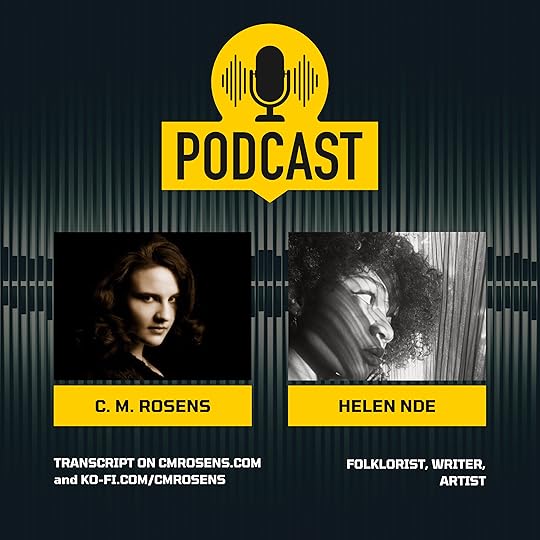
Helen Nde on the Dark Side of Family in African Folklore
Lucy Rose on Gothic Filmmaking and Uses of English Folklore
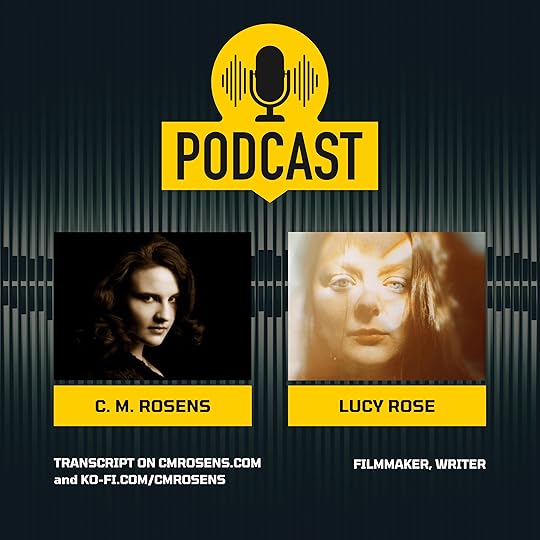
April 4, 2025
Author Spotlight: N.R. Wolfman
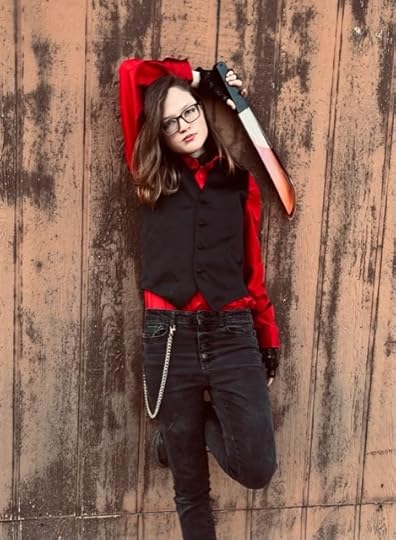
N.R. Wolfman (he/she) is an indigenous, queer indie horror author from Colorado who loves to tell her stories to anyone willing to listen.
She travels worldwide speaking about creative writing and horror’s connection to psychology when she’s not working on her latest manuscript.
You can often find her curled up in her college’s student union with a cup of coffee and some lunch sketching out her newest manuscript ideas.
Author Links:
Twitter: @nr_wolfman
Slasher: @nr_wolfman
Instagram: @nr_wolfman
Threads: @nr_wolfman
Website: thewolfmanfiles.substack.com
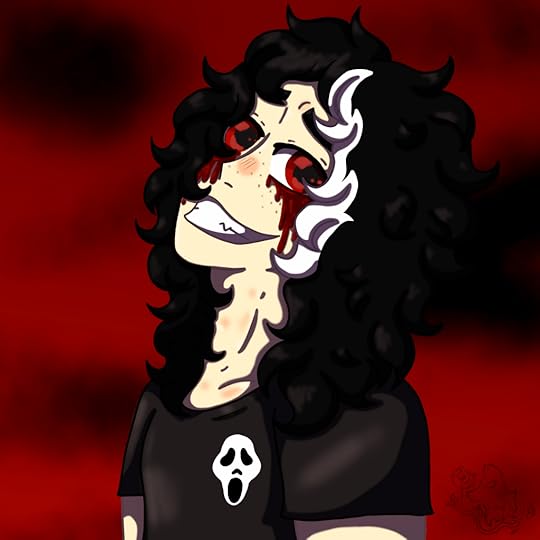 [image error]
[image error]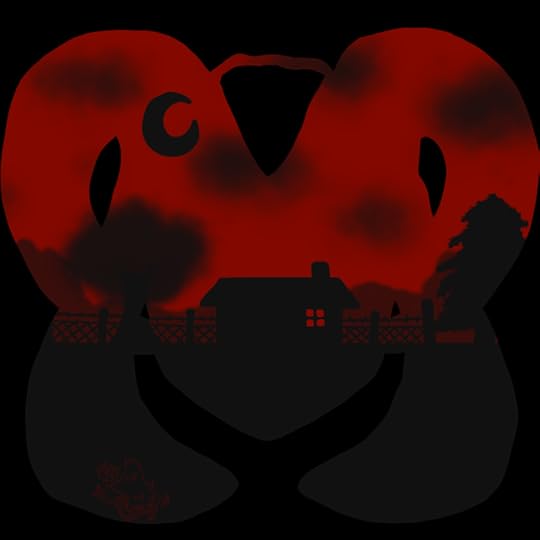
Let’s talk about your debut novel, kill-or-be-killed YA folk horror The Woods. What inspired this idea, and the evil known as the Hydren?
When I was younger, I spent a lot of time during the summer at my grandma’s house which is close to the Ouachita Mountains. This area holds a lot of stories similar to those in the Appalachian mountain range due to its isolation and its connection to the indigenous tribes in Oklahoma, so I grew up hearing all these tales about the area.
Now, my grandma had a massive forest on her property that my family and I used to play in growing up. The forest itself was extremely thick, you were vulnerable on all sides and you could never see what was coming at you. You’d hear sounds, but couldn’t pinpoint where they were, and if someone got lost, good luck finding them.
When I first wrote The Woods, I was 13 and my English final was to write a short story that we’d be working on for the next two to three weeks. We got assigned the project before Thanksgiving break and during that break, I was down at my grandma’s house and kept seeing the forest behind it which made me think, what would happen if there was something out there? Hence, The Woods was born, I spent multiple hours each day investing myself in this story and by the time three weeks were up, I had an 150-page manuscript.
The Hydren itself was born from a nightmare. I kept having dreams of this two-headed beast chasing me and stalking me, so I decided what better place to put it than the manuscript I was working on.
The Hydren itself was originally supposed to have multiple heads and be more like a Hydra, the name Hydren itself is a combination of the words Hydra and demon.
During editing, however, I got really invested in Stranger Things and I’d just seen Alien, so I started modifying the design. The Hydren itself went through so many changes. It went from an otherworldly eldritch being to a goat that was corrupted via demonic sacrifice to the hell guardian we know and love now. However, you can still see elements of the goat-like design in the art I have up of him with the horns, the floppy ears, the hooved hands, etc.
You published The Woods when you were only 16, which is a great achievement! Do you think that if you wrote this story now, there would be many changes? What might those be?
I did recently release a second edition of The Woods that slightly modified it, but it wasn’t changed significantly. I did add a few new possession/psychological scenes, but these were just minor insertions.
If I could fully rewrite it, I might age it up a bit more to kind of a new adult level because I feel like there could’ve been a bit more done if the characters were 17-18.
I’d probably add a lot more swear words and I know that can kind of be a controversial statement, but if you saw a bloody eldritch abomination in front of your face waiting to eat you, I bet you’d say a few choice words.
I feel like I’d also want to elaborate more on Lexi’s relationship in the past with Ebony because I feel like that was something that I kind of glossed over and if I had elaborated that, the reader impact would’ve been significantly stronger when it came to her possession.
What are the main themes in The Woods, and how does the world, settings, characters and genre help you to convey them?
There are so many themes that are subtly included or just straight-up stated. The Woods’ primary themes focus on grief and loss since the loss of Amara is the primary plot point and I think horror itself has to be a staple of grief or loss.
I’ve created this hypothesis called the Fearamid Hypothesis that all horror media has to contain themes of grief, loss, and trauma even if not directly stated. We’re still in the process of running research on it, but it seems that all main characters in any horror media format suffer from grief, loss, and trauma that’s based around those two other themes.
I have some other subtle themes in the book including the negative result of police corruption, how police cases and traumatic loss strain family ties, and the idea of how internalized and subtle external homophobia impacts queer people.
Each of my characters also alongside the story has their own personal struggles they’re going through alongside the main plot which kind of talk about those other themes. Michael is trying to play hero and hiding parts of himself that he views are a part of a negative past even though they impact him currently.
Chris is dealing with an unsafe home situation and external homophobia being directed at him.
Tyler struggles with his internalized homophobia and being viewed as weak when he’s not that way.
Journey is trying to help in any way, but feels trapped in the city of Hecate and is worried about her own family.
Lexi is dealing with the loss of her sister and her relationships straining with her other family members over the loss.
There’s just a lot of subtle themes that are mentioned that you can find scattered throughout the book.
Tell us about your characters – which character did you find easiest to get under the skin of, and which was the hardest to write?
When it came to the easiest character to write, Lexi and Michael were pretty simple. The Woods will be a series as implied by the end of the book, so I liked the idea of subtly introducing Lexi and Michael as the kind of main characters that are going to slowly be fleshed out compared to Chris and Tyler who were kind of fleshed out more in the beginning.
Now as for the hardest characters, the crown has to go to Ebony and the Hydren.
Ebony and the Hydren have a very close relationship and because of that, they have to overlap in a sense. You have to note the Hydren’s powers and abilities along with Ebony’s own and the constraints of those powers when it comes to a human vessel.
The Hydren itself also has two forms in a sense because of this. Not only does it have the sentient, human vessel that is limited with power yet intelligent, but also its animalistic, physical vessel that hunts like a predator yet is still humanoid.
However, if I had to pick a favorite character to write, it has to go to Chris. Chris is the character I view as most like myself with his punk style, his queerness, his hobbies, and his horribly timed jokes. It was so easy to write his dialogue and background because it felt like I was writing myself in a sense, so anything you see from Chris came completely naturally.
As a queer and neurodivergent author yourself, do you find yourself more drawn to writing queer and ND characters, and is this always a conscious part of character development or something that comes in naturally and organically as you develop them?
When I write my characters as queer and neurodivergent, they come naturally. I have this weird thing where in my mind, I can vividly see myself having a conversation with these characters I made. I see their speech patterns, their interests, and it kind of comes naturally, like they develop their own personality in a sense.
I’ve also been told my characters are kind of neurodivergent coded when I didn’t intend for them to be that way because sometimes, like with Chris, I have characters that take after my personality. I will never queerbait my audience though and that is my promise.
Share some reader responses to The Woods – what has been your favourite so far?
I’ve had some really fun reader responses over the years.
I had a woman in her 50s approach me as a teenager and tell me that The Woods made her sleep with the lights on for three days because her house was near a forest, so she thought the Hydren was coming for her.
When I was in Toronto for Fan Expo Canada, and I’m so sad I never got to talk to the person, a few of my family members were in line to get seats for my dad at my panel and this lady was gushing about how much she loved my work. I didn’t get to talk to her though and I still regret that, so if she sees this, please know that made my week.
Someone told me that The Woods was one of their top reads for 2024 as well and I couldn’t get over it for a week. That night I was so excited, I went out and got celebratory boba because I was so proud.
There’s been a few times that I’ve happy cried during my career with my writing.
I’ve received well wishes for my future in the horror industry from a few notable people, but I had a reader once that made me cry after a panel.
So, I always stay after my panels for a bit (around 5-10 minutes) to clean up and talk to folks in case they’re too shy to ask a question in front of everyone or they want their book signed. This day, I was going through a personal situation prior to the panel and I was cleaning up to head out for the day when this mom approached me with her kids. Her kid had my book and she told me that her kid read my work and that inspired them to be a writer. I spent around five minutes talking to them, but when that was over, I went out to see my grandma who was waiting on me to finish up and head out for the day. I got into the car and I just started bawling from joy, I didn’t think I’d ever get to that point in my career where someone was inspired to create because of me. That’s why I love doing interviews so much because I feel like if I share my story, more people will feel inspired to create and write. Everyone has a story inside of them, it just takes you to publish it.
Like This? Try These!April 3, 2025
Author Spotlight Blog Tour: Jorah Kai
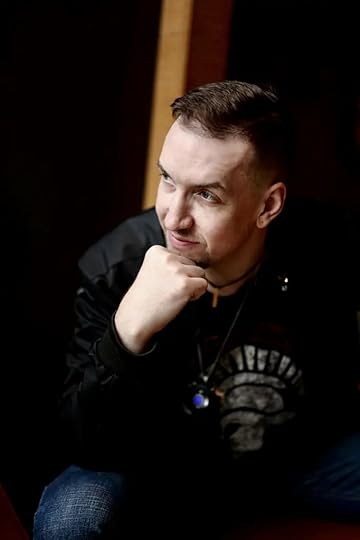
Jorah Kai (he/him) is an author, journalist, musician, and existential detective.
His latest book, The Sun Also Rises on Cthulhu, reimagines Hemingway’s classic with a Lovecraftian twist, fusing literary fiction with cosmic horror.
He is also the author of Amos the Amazing, a solarpunk fantasy that became an international bestseller.
When not writing, he’s pondering the abyss, teaching, or trying to make sense of the void.
Author Links:
Website: jorahkai.com
Instagram: @JorahKai
Threads: @JorahKai
Facebook: @JorahKaiAuthor
Bluesky: @jorahkai.bsky.social
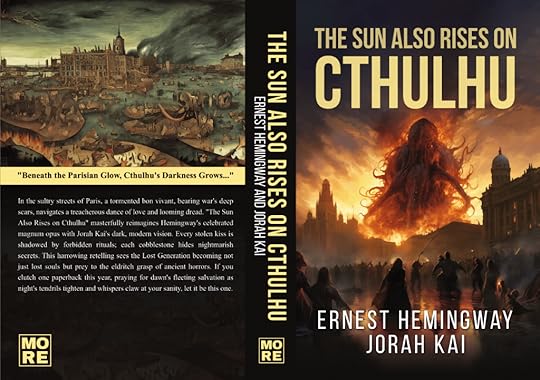 Jan Dornig – Cover Art
Jan Dornig – Cover ArtInterior Illustrations by 王凯 and 王本 (Wang Kai and Wang Ben)
Mirko Fermani – Book Layout and Design
Welcome Jorah, let’s chat about your work, The Sun Also Rises On Cthulhu, which is a cosmic horror version of Ernest Hemingway’s 1926 classic, The Sun Also Rises. What’s your relationship with Hemingway’s book, first of all, and how did this develop into your novel?
Hemingway’s The Sun Also Rises is a novel I’ve admired for years—a brilliant, melancholic meditation on the Lost Generation, disillusionment, and human frailty.
I’ve been teaching Hemingway for a while now, especially The Old Man and the Sea, and there’s something about his raw, stripped-down style that just seeps into your bones when you spend enough time with it.
This project actually started as a creative writing exercise—not so different from what another famous student of Hemingway, Hunter S. Thompson, used to do. Thompson would type out entire Hemingway novels word for word, just to feel the power of his prose flow through him like an electric current. I wanted to do something similar—but in my own way. I started rewriting parts of The Sun Also Rises, playing with it, experimenting, seeing what happened when I pushed Hemingway’s existential crisis into cosmic horror territory. Somewhere along the way, the story took on a life of its own.
The idea of Pride and Prejudice and Zombies really inspired me back in college—the idea that you could take a classic, infuse it with something wildly different, and create a fusion that’s both familiar and utterly new. So that’s how The Sun Also Rises on Cthulhu was born. It’s a big, beautiful mess—a collision of literary fiction and cosmic horror, of Hemingway’s stoic realism and Lovecraft’s boundless dread.
Thematically, Hemingway and Lovecraft were contemporaries—both writing in the wake of WWI, both exploring existential despair and the limits of human understanding. So, why not take that raw emotional intensity and crank the horror to eleven?
At its heart, it’s the same story—the same wounded, wandering souls, still searching for meaning, still drinking and fighting and pretending not to care. But now, instead of just struggling against their own inner void, they’re pitted against an ancient, incomprehensible force that actually wants to consume them. And somehow? That felt right.
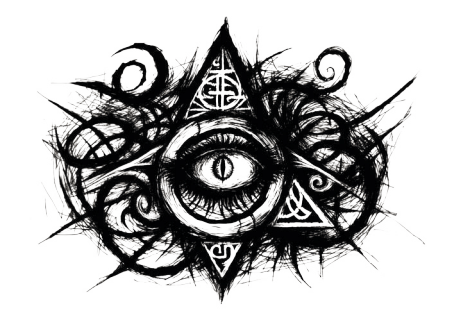 Interior Illustrations by 王凯 and 王本 (Wang Kai and Wang Ben)
Interior Illustrations by 王凯 and 王本 (Wang Kai and Wang Ben) Mirko Fermani – Book Layout and Design
Jan Dornig – Cover Art
What were the main challenges in creating this fusion of your cosmic horror vision and Hemingway’s original prose?
The hardest part of working with Hemingway was the fact he’s been dead half a century.
Once we navigated past that, the rest was history….Merging Hemingway’s lean, direct prose with Lovecraft’s purple, gothic horror was like blending whiskey with absinthe—it had to be done carefully, with intent, and just the right amount of madness.
Hemingway’s style is famously spare, whereas cosmic horror thrives on the unknowable, the indescribable.
The trick was weaving that creeping dread into the spaces Hemingway left open.
His characters drink, flirt, fight bulls—meanwhile, the shadows stretch too long, the sea whispers of something ancient, and reality itself begins to warp.
Another challenge? Respecting Hemingway’s tone while making it my own. I didn’t want to simply mash them together—I wanted to create something that felt natural and inevitable, as if the horror had been lurking beneath the surface of the original all along.
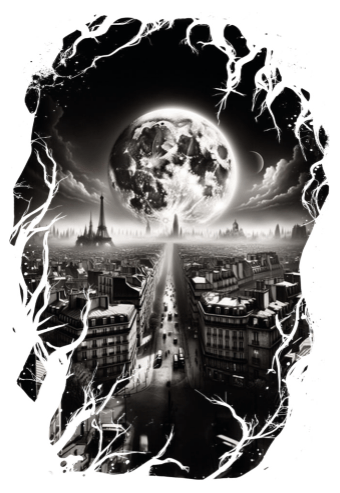 Art by 王凯 and 王本 (Wang Kai and Wang Ben)
Art by 王凯 and 王本 (Wang Kai and Wang Ben)How does this novel fit into your solarpunk ethos (and can you explain a little about solarpunk for those unfamiliar with the term)?
Solarpunk is about hope, resilience, and reimagining the future—a counterpoint to dystopian fiction. It envisions a world where technology, nature, and humanity coexist harmoniously, rather than spiraling into collapse.
So how does cosmic horror fit in? Well—what if the things in the dark don’t want us to evolve? What if something ancient has been orchestrating our self-destruction for millennia?
The Sun Also Rises on Cthulhu flirts with that idea—the possibility that our failures, our inability to rise above greed and war, aren’t entirely our own. And yet, despite the horror, there’s always a spark of resistance. That’s where the solarpunk ethos lingers—a belief that even in the face of cosmic insignificance, we can choose to fight for meaning.
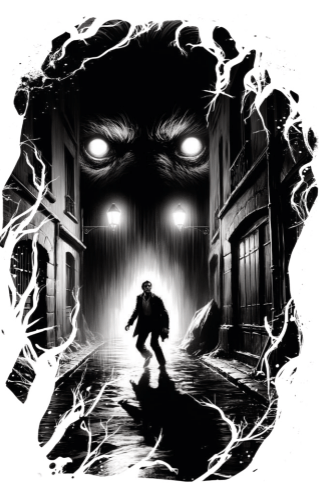 Art by 王凯 and 王本 (Wang Kai and Wang Ben)
Art by 王凯 and 王本 (Wang Kai and Wang Ben)How did you set about navigating the dynamics of the main characters and expanding on the themes – can you tell us about your writing process?
The characters in The Sun Also Rises are already wrestling with existential despair, broken relationships, and a world they no longer understand. In my version, they’re still the same lost souls—but now, the universe itself is hunting them.
My process started with deep immersion—I reread Hemingway, absorbed his rhythms, let the characters breathe. Then I started injecting horror organically—subtle at first. A wrongness in the air. A phrase that repeats like a curse. The way the ocean feels deeper than it should. I let the horror creep in slowly, until suddenly, they’re in too deep. Because that’s how cosmic horror works—you don’t realize you’re doomed until it’s far too late.
But beyond Hemingway’s Paris, I had another advantage—I lived it. I was a DJ and music producer for 25 years. I’ve played thousands of bars, stayed up to see the sun rise, had my heart ripped out of my chest, danced on, and been eaten for breakfast more times than I care to remember.
The nights blend into mornings, the drinks flow, the music pulses, and at some point, you start wondering if you’re still awake or if you’re already dreaming. So getting into the spirit of Hemingway’s Paris was as easy as cracking open a bottle of fine whiskey.
I knew the madness, the desperate highs and crushing lows, the neon-lit longing of people trying to forget something they can’t name. But the madness—**the void, the mirror—**that took real pain. That took sacrifice. Because you can’t just write cosmic horror—you have to feel it. You have to stare into the abyss until it stares back. Until you realize that maybe it always was. I did it for art. I hope it was worth it.
 Art by 王凯 and 王本 (Wang Kai and Wang Ben)
Art by 王凯 and 王本 (Wang Kai and Wang Ben)Book Design and Layout by Mirko Fermani
You’ve written a mix of cosmic horror, solarpunk, and nonfiction; how do you feel this latest book fits in with your work in terms of its themes, style and content, or do you feel that this is new territory for you?
It’s both a natural evolution and a bold leap into madness. Amos the Amazing is solar-fantasy, full of wonder and mythic adventure. The Sun Also Rises on Cthulhu is existential horror, full of dread and broken souls. And yet, they both wrestle with the same big questions:
What does it mean to be human?
How do we fight despair?
Where does free will end and fate begin?
This novel also ties into my larger “Mirrorverse” quadrilogy, which explores the tension between hope and horror, the seen and unseen, the known and unknowable. So, in a way, it’s a new experiment—but also another piece of a much larger puzzle.
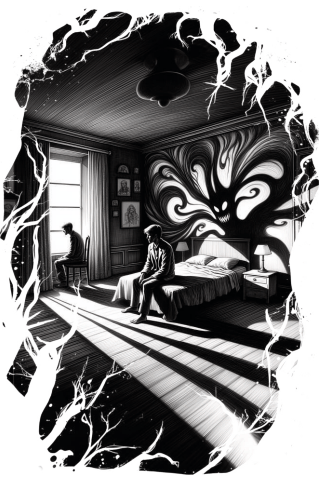 王凯 and 王本 (Wang Kai and Wang Ben)
王凯 and 王本 (Wang Kai and Wang Ben)What has been your favourite reader responses to your work so far – either your latest novel, or to your work in general?
I love hearing that my books stick with people—that the words linger, haunt them, make them question things.
One of my favorite responses was from a reader who said, “Reading The Sun Also Rises on Cthulhu felt like drowning in moonlight—beautiful, terrifying, and impossible to look away from.”
That’s exactly the feeling I wanted to create.
Another? A student who read Amos the Amazing and said it made them believe in magic again. That’s the dream, isn’t it?
I’m now teaching a new book – The Hunger Beyond – to 1000 students in my cyberpunk supercity of Chongqing, and a student came to me to tell me it was much too short and they want more of it. You’ve got to love that.
Ultimately, my goal isn’t just to entertain—it’s to leave an imprint. If my words echo in someone’s mind long after they’ve closed the book, then I’ve done what I set out to do.
Like This? Try These: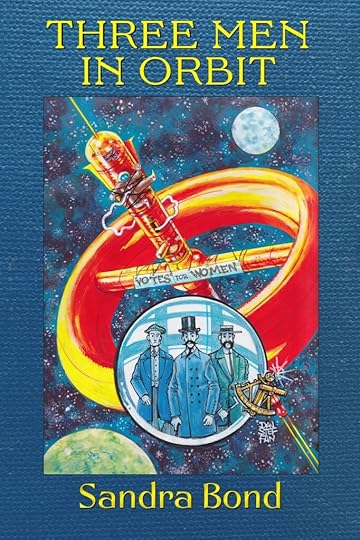
Sandra Bond’s reimagining of Jerome K. Jerome’s classic, Three Men in a Boat, turned Jules Verne-esque Sci-Fi, Three Men in Orbit.
Sci-Fi Comedy.
Sandra’s Author Spotlight will be featured on cmrosens.com on 18 July 2025.
sandra-bond.com/three-men-in-orbit – find out more.
Related Posts:


